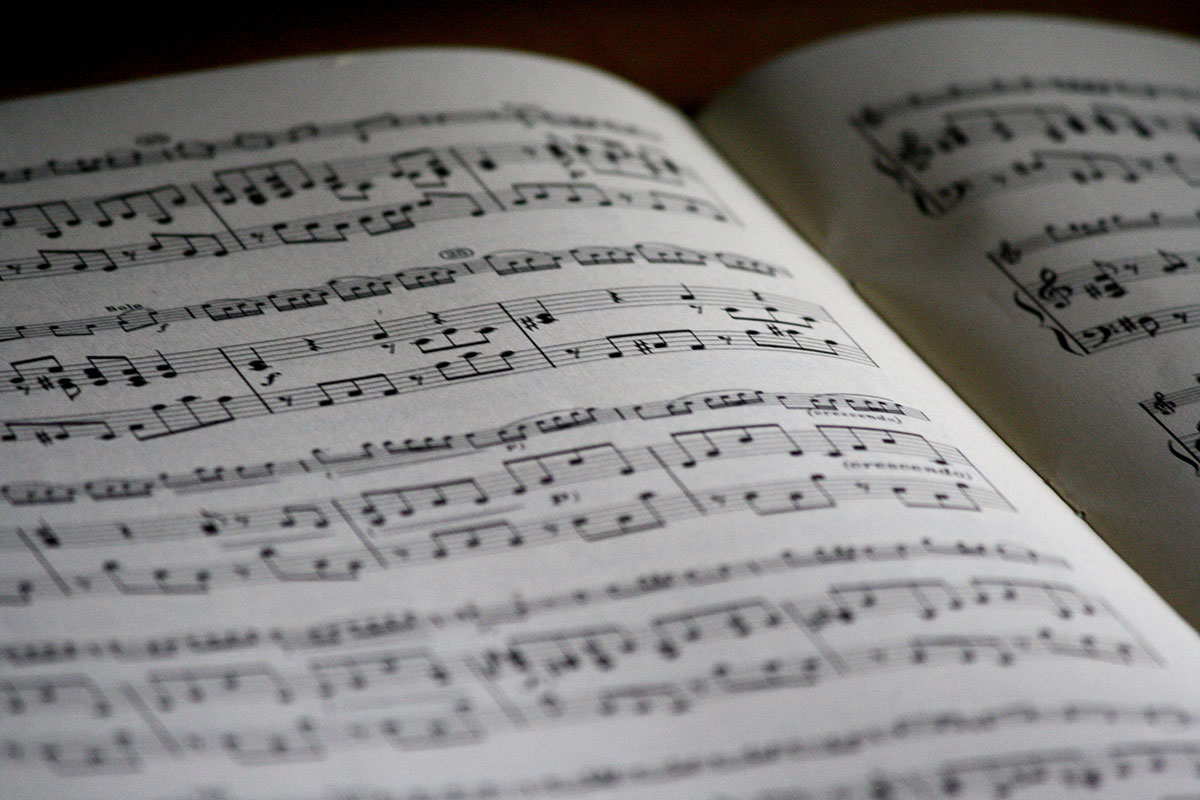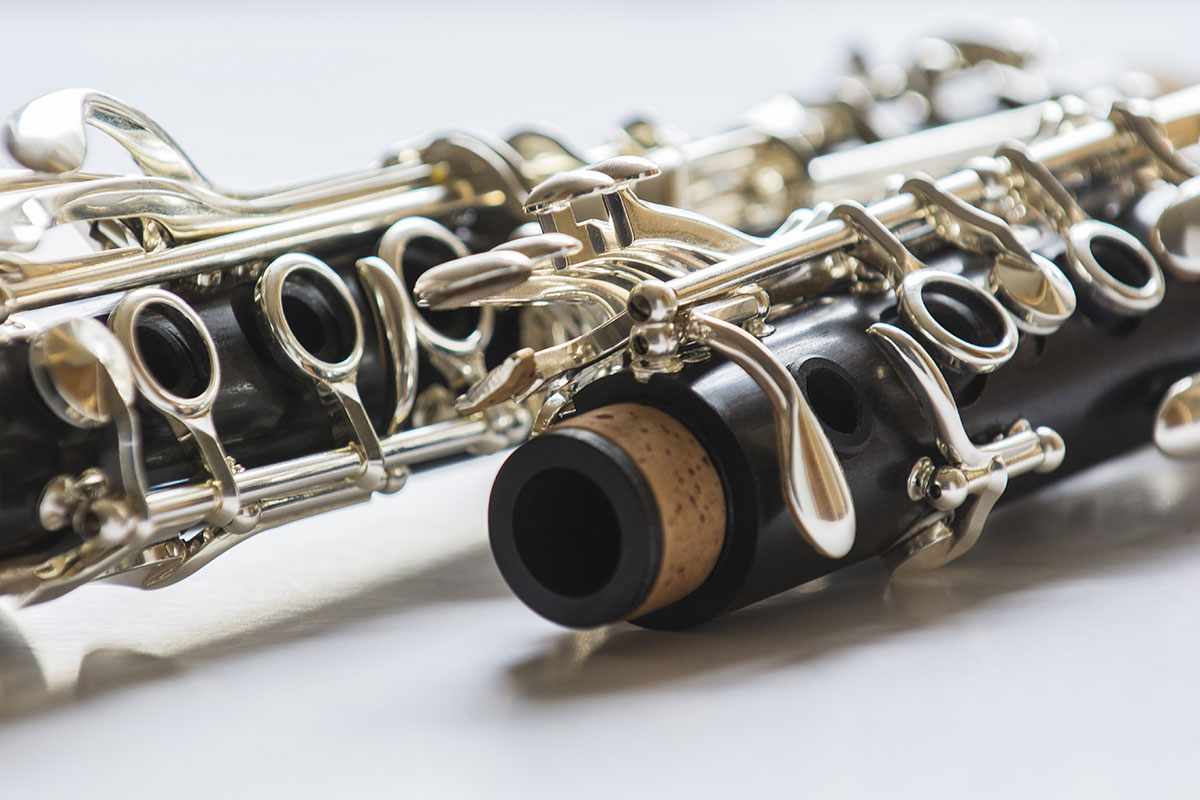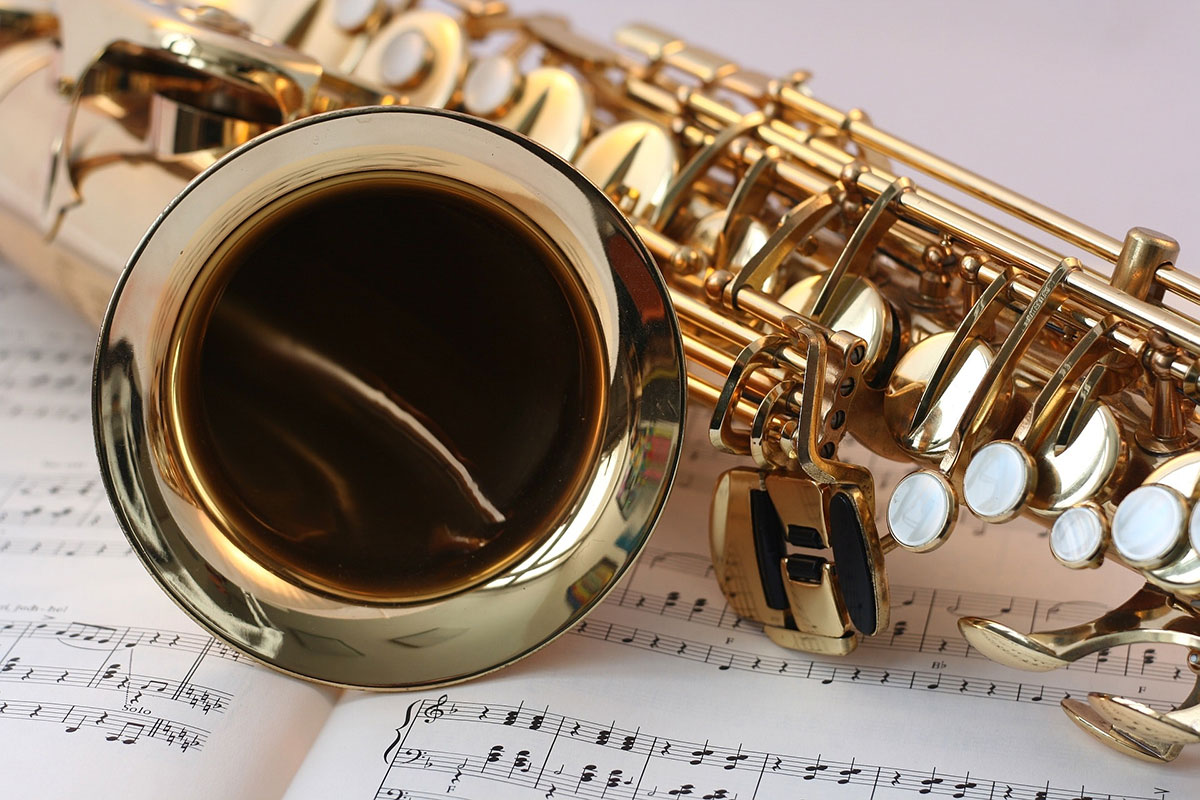CLICK ON A COMPOSER
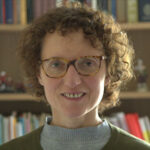 Alexandra Lehmann is a British (Doune, Perthshire) and French (Fontainebleau, Seine-et-Marne) viola player and teacher living in Eastbourne. Alexandra studied at the Rubin Academy of Music, Jerusalem; followed by post-graduate studies at the Royal Scottish Academy of Music and Drama, Glasgow. As a viola player, she performed with the RSNO, ESO and São Paulo Opera Orchestra and continues to freelance in East Sussex. Alexandra has a daughter, Clara, who is a scientist ,bassoonist and flautist; and a little black cat called Popi.
Alexandra Lehmann is a British (Doune, Perthshire) and French (Fontainebleau, Seine-et-Marne) viola player and teacher living in Eastbourne. Alexandra studied at the Rubin Academy of Music, Jerusalem; followed by post-graduate studies at the Royal Scottish Academy of Music and Drama, Glasgow. As a viola player, she performed with the RSNO, ESO and São Paulo Opera Orchestra and continues to freelance in East Sussex. Alexandra has a daughter, Clara, who is a scientist ,bassoonist and flautist; and a little black cat called Popi.
Allan Herbie Jones’ playing and conducting career has been temporarily cut short lately through illness which has resulted in him having more time for writing and arranging. In the past he tried the professional musician route, playing trumpet in numerous  orchestras and dance bands and conducting small orchestras and wind ensembles. He then retrained and taught IT at higher level, still playing and conducting part time.
orchestras and dance bands and conducting small orchestras and wind ensembles. He then retrained and taught IT at higher level, still playing and conducting part time.
Being self taught, his love of composing and arranging tunes for all types of instruments has brought him great pleasure and he intends to keep on writing whenever he gets the inspiration.
His main objective is to try and inspire wind players that quality sound comes from producing quality air, and that takes quality practice.
His compositions are mostly based on a simple tune. Sometimes decorated and sometimes plain. He hopes you enjoy playing them.
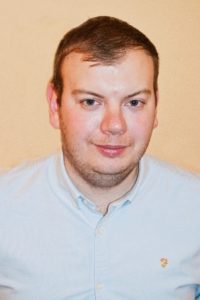 Andrew Middleton is a composer, arranger and music teacher based in the North East of England. Andrew plays flute, saxophone and piano, but whilst studying music at Newcastle University (2007 to 2012) Andrew specialised in contemporary composition and arranging music. Since then Andrew has had the opportunity to work with a range of soloists, ensembles and composers including: the saxophonist Amy Dickenson, British composer Colin Matthews, and the Kokoko Ensemble as part of the Bournemouth Symphony Orchestra Composer’s Day, 2015. As well as composition, Andrew dedicates his time to Music Education, teaching music to children of a range of ages and abilities.
Andrew Middleton is a composer, arranger and music teacher based in the North East of England. Andrew plays flute, saxophone and piano, but whilst studying music at Newcastle University (2007 to 2012) Andrew specialised in contemporary composition and arranging music. Since then Andrew has had the opportunity to work with a range of soloists, ensembles and composers including: the saxophonist Amy Dickenson, British composer Colin Matthews, and the Kokoko Ensemble as part of the Bournemouth Symphony Orchestra Composer’s Day, 2015. As well as composition, Andrew dedicates his time to Music Education, teaching music to children of a range of ages and abilities.
 Anthony Whittaker is a British composer. He graduated with a BMus(hons) from the University of London and has an MMus and PhD from the University of Liverpool.
Anthony Whittaker is a British composer. He graduated with a BMus(hons) from the University of London and has an MMus and PhD from the University of Liverpool.
Composition was an interest during his early musical development, and it became increasingly important during the 1990s where he composed for staff and students at the Performing Arts department of Liverpool Community College. Anthony studied composition as a postgraduate at the University of Liverpool with James Wishart and the American composer, Ben Hackbarth.
Notoriety first came in 2000 with the Society for the Promotion of New Music’s performance of Drift for six pianos which was performed alongside Steve Reich’s Music for Six Pianos; the principal pianist being Joanna MacGregor. Choral music became important after this time with Agnus Dei, for male voices received performances in Berlin and Montreal. A Litany, also for male voices, was performed at the International Eisteddfod, Wales and broadcast on S4C television. Larger commissions followed. For example, The Prodigal Son for choir, two pianos and percussion. His choral music has also been performed at the Royal Festival Hall.
Chamber music has also played an important part. There are two works for string quartet and Indiscretions with Sarabande was written for the Baroque ensemble L’indiscret in 2007. The Clarinet Quintet was completed in 2009 during a period working in Singapore and Taiwan.
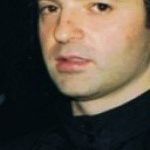 Antonio D’Amato is intoxicated by music. He graduated in Piano, Harpsichord, Music for Multimedia and Instrumental Music Teaching. In 1996 he qualified as sound engineer at the Scuola di Alto Perfezionamento Musicale di Saluzzo. He also studied composition for eight years, bassoon for three, and baroque organ. In 2010 he was Ondes Martenot student in Strasbourg and Paris. Most of his compositions are written for his musician friends. At university he was a student in Media and Communication Sciences. He is currently working on an Electronic Music course. He works mainly as piano teacher and sound engineer. His first electronic composition was selected for a performance at the ICMC 2012 the International Computer Music Conference.
Antonio D’Amato is intoxicated by music. He graduated in Piano, Harpsichord, Music for Multimedia and Instrumental Music Teaching. In 1996 he qualified as sound engineer at the Scuola di Alto Perfezionamento Musicale di Saluzzo. He also studied composition for eight years, bassoon for three, and baroque organ. In 2010 he was Ondes Martenot student in Strasbourg and Paris. Most of his compositions are written for his musician friends. At university he was a student in Media and Communication Sciences. He is currently working on an Electronic Music course. He works mainly as piano teacher and sound engineer. His first electronic composition was selected for a performance at the ICMC 2012 the International Computer Music Conference.
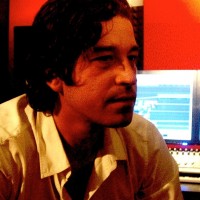 Apostolos Loufopoulos studied music at the Ionian University, Greece (Music Degree) and at City University, London (PhD in Music). He creates electroacoustic music and sound art for digital media. His music has been performed internationally in renown festivals of contemporary music (such as ICMC, Synthese, L’Espace Du Son and others) and has received a number of awards at international competitions such as Αrs Electronica (Austria), Bourges (France), Noroit (France), Metamorphoses (Belgium), Space of Sound (Belgium), Franco Evangelisti (Italy), Musica Nova (Czech Republic). He is a founding member of HELMCA (Greek Union of Composers of Electroacoustic Music, www.essim.gr) and the Greek Society for Acoustic Ecology. Also a member of Sonic Arts Network and Project itinerant. He is assistant professor at the Ionian Univ. (Dep. A.V.A).http://apostolosloufopoulos.wordpress.com/ http://www.cdbaby.com/cd/apostolosloufopoulos.
Apostolos Loufopoulos studied music at the Ionian University, Greece (Music Degree) and at City University, London (PhD in Music). He creates electroacoustic music and sound art for digital media. His music has been performed internationally in renown festivals of contemporary music (such as ICMC, Synthese, L’Espace Du Son and others) and has received a number of awards at international competitions such as Αrs Electronica (Austria), Bourges (France), Noroit (France), Metamorphoses (Belgium), Space of Sound (Belgium), Franco Evangelisti (Italy), Musica Nova (Czech Republic). He is a founding member of HELMCA (Greek Union of Composers of Electroacoustic Music, www.essim.gr) and the Greek Society for Acoustic Ecology. Also a member of Sonic Arts Network and Project itinerant. He is assistant professor at the Ionian Univ. (Dep. A.V.A).http://apostolosloufopoulos.wordpress.com/ http://www.cdbaby.com/cd/apostolosloufopoulos.
Myrto Korkokiou and Apostolos Loufopoulos have been collaborating since 2000 in composing and performing widely works for flute and electronic sounds, computer processed and prerecorded in real time and diffusion. Her main interest in music involves improvisation and performance with electronics means, as well as composition for flute and electronics. In their works the main target is to create sound environments, life like or imaginary, where the flute is the center of the sound action. The flute with the use of modern flute techniques creates a variety of timbres, which extend and enrich its sound spectrum when combined with electronic sounds either pre-recorded, or processed in real-time. Their pieces have been awarded in electroacoustic composition competitions such as Franco Evangelisti, 32 Bourges International Competition, Music Nova 2004, 2006, 2014, Dimitri Dragataki 2007- 2008) and they have been published by Forton Music: https://www.fortonmusic.co.uk/.
Beverly Lewis studied music at Mount Allison University, majoring in piano. She teaches piano at the University Settlement Music and Arts School, directs music at Bathurst United Church and is a freelance accompanist and chamber musician. Bev is also  a published composer of vocal, woodwind, choral and piano music. Her compositions have been performed in Austria, Canada, France, Italy, the United Kingdom and the United States and her music has been broadcast on CBC Radio. She has won several awards (Amadeus Choir Carol competition and Toronto Arts Council) and her pieces have been recorded by various musicians. Fundy Temperaments, a piece for cor anglais and piano has been recorded by Michele Fiala on her latest CD ‘Overheard’, released by MSR Classics; and her piece ‘A Soldier’s Prayer’, a choral work has been recorded by the Saskatoon Chamber Singers on their latest CD, “Remember – Solace and Consolation”. On May 20, 2017, Bev’s piece for piano
a published composer of vocal, woodwind, choral and piano music. Her compositions have been performed in Austria, Canada, France, Italy, the United Kingdom and the United States and her music has been broadcast on CBC Radio. She has won several awards (Amadeus Choir Carol competition and Toronto Arts Council) and her pieces have been recorded by various musicians. Fundy Temperaments, a piece for cor anglais and piano has been recorded by Michele Fiala on her latest CD ‘Overheard’, released by MSR Classics; and her piece ‘A Soldier’s Prayer’, a choral work has been recorded by the Saskatoon Chamber Singers on their latest CD, “Remember – Solace and Consolation”. On May 20, 2017, Bev’s piece for piano
‘Mit Fried und Freud ich fahr dahin’, was premiered by pianist, Dr Janet Hammock in Sackville N.B. as part of a benefit concert in support of Tantramar Hospice Palliative Care Organization. On June 1, 2017, her piece, Swan Diversions (for oboe and piano) was premiered at Hart House, University of Toronto.
Blair Thomson studied piano from the age of four and began composing seriously as a teenager, at which time he completed his studies in piano and 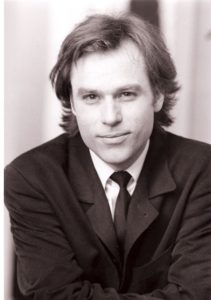 theory from the Royal Conservatory of Music. He graduated from York University in composition before studying ethnomusicology and philosophy of mind as a graduate student.
theory from the Royal Conservatory of Music. He graduated from York University in composition before studying ethnomusicology and philosophy of mind as a graduate student.
Mr. Thomson is active as a composer of contemporary concert music, a symphonic arranger of well over 100 arrangements for orchestras and ensembles around the world, a pianist and conductor. Moreover, he has composed extensively for theatre, dance, opera, musical theatre, film and television. For l’Orchestre Symphonique de Montréal he composed a rereading of Michel Rivard’s songs, culminating in an acclaimed studio album as well as writing an unprecedented version of Rhapsody in Blue for ten pianos and orchestra. In 2014, ‘La Symphonie Rapaillé’, a recording he composed, arranged and conducted for OSM based on Gaston Miron’s poetry, was the recipient of a prestigious Félix Award.
Brian Inglis studied music at the University of Durham and composition at City University, London (with Simon Holt and Rhian Samuel). An MA was awarded in 1993 – along with the Worshipful Company of Cordwainers’ Prize – and a PhD in 1999. His output 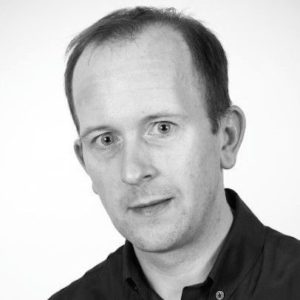 ranges from chamber and choral music to orchestral and operatic works, and combines experimental elements with eclectic historical, geographical and genre influences – from non-Western to popular music. Brian first came to attention as a composer when Responsory – a setting of words by Hildegard of Bingen – was performed at the 1992 Huddersfield Festival. His music and arrangements have been heard on BBC 2 and radios 1, 2 and 3, radio Cymru, radio Wales, Resonance FM (London) and Bayern 2 (Germany), as well as at the Greenbelt, Bestival, Truck, Deal, Guildford, and Sonorities festivals; and at venues including the Wigmore Hall, King’s Place, St John’s Smith Square, Cadogan Hall, Colston Hall and St George’s Bristol. Notable performers include Roderick Williams, Lore Lixenberg, Consortium 5, the PM Music Ensemble (Wales) and Rainbow International Ensemble (Bath). Major works include Visions of Sorrow and Joy (1998) – a commission from Bath Choral Society sponsored by Making Music’s pilot ‘Adopt a Composer’ scheme; Jubilee Prayer, commissioned to celebrate the Millennium in Wales; and Highbury Fields, commissioned as a collaboration with lyricist Charles Hart (The Phantom of the Opera, Bend it like Beckham) to celebrate the 40th anniversary of Islington Choral Society in 2013.
ranges from chamber and choral music to orchestral and operatic works, and combines experimental elements with eclectic historical, geographical and genre influences – from non-Western to popular music. Brian first came to attention as a composer when Responsory – a setting of words by Hildegard of Bingen – was performed at the 1992 Huddersfield Festival. His music and arrangements have been heard on BBC 2 and radios 1, 2 and 3, radio Cymru, radio Wales, Resonance FM (London) and Bayern 2 (Germany), as well as at the Greenbelt, Bestival, Truck, Deal, Guildford, and Sonorities festivals; and at venues including the Wigmore Hall, King’s Place, St John’s Smith Square, Cadogan Hall, Colston Hall and St George’s Bristol. Notable performers include Roderick Williams, Lore Lixenberg, Consortium 5, the PM Music Ensemble (Wales) and Rainbow International Ensemble (Bath). Major works include Visions of Sorrow and Joy (1998) – a commission from Bath Choral Society sponsored by Making Music’s pilot ‘Adopt a Composer’ scheme; Jubilee Prayer, commissioned to celebrate the Millennium in Wales; and Highbury Fields, commissioned as a collaboration with lyricist Charles Hart (The Phantom of the Opera, Bend it like Beckham) to celebrate the 40th anniversary of Islington Choral Society in 2013.
A lecturer at Middlesex University, as well as a composer Brian is an active researcher and writer on music. From 2003 – 2007, he was a member of the pop-rock band Hicks Milligan-Prophecy.
Bruce Boardman studied clarinet, saxophone and piano at The Watford School of Music, then piano and composition later at London’s Royal Academy of Music. He began his career working as a pianist with a  wide variety of performers, from jazz names such as clarinettist Terry Lightfoot and singer George Melly to show business stars like Val Doonican and Roy Castle. This included tours, television, radio and recording.
wide variety of performers, from jazz names such as clarinettist Terry Lightfoot and singer George Melly to show business stars like Val Doonican and Roy Castle. This included tours, television, radio and recording.
During this time Bruce formed his own band which toured internationally and in the U.K. The experience he gained arranging and composing the band’s repertoire has proved valuable ever since. Bruce’s band often appeared with distinguished guest artists from the world of jazz including guitarists Barney Kessel and Herb Ellis, trombonist Al Grey and trumpeter Red Rodney.
Nowadays Bruce divides his time between instrumental teaching, live jazz performances and composition. Aside from the world of jazz, Bruce Boardman plays organ, clavichord and harpsichord, the latter of which he studied privately with the distinguished performer Maggie Cole.
Cedric Peachey writing music in his teens and continued composing in such spare time as he could find during four decades working in commercial management and consultancy. Largely self-taught, the first public performances of his music began in 2002, since when he 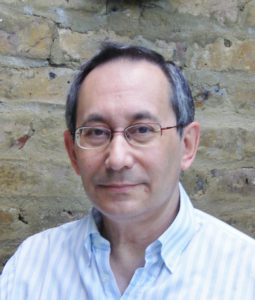 has had pieces performed in London, St Albans, Brighton, Portsmouth and Colchester. Works performed to date include music for wind band, woodwind ensembles, brass quintet, voice, piano, organ, choir, orchestra, percussion ensemble, electronics and various chamber groups. In 2012, Cedric led a team that presented four multi-media concerts across London as part of the Cultural Olympiad. A year later, his ‘Passacaglia’ for brass quintet was performed in London by Total Brass, the award-winning brass ensemble. In 2014, his ‘Prelude – Red Riding Hood’ for wind orchestra won the new composition award hosted by the annual Waterlooville Music Festival. In 2015, he collaborated with four other composers to present Songcircle, a concert of song settings and solo piano pieces in aid of Macmillan Cancer Support. In 2017, he contributed two pieces for woodwind for ‘MOSAIC’, a concert performed by the award-winning London Myriad Ensemble. During the period 2016-17, he served as Chair of London Composers Forum, having previously held other positions on the Committee.
has had pieces performed in London, St Albans, Brighton, Portsmouth and Colchester. Works performed to date include music for wind band, woodwind ensembles, brass quintet, voice, piano, organ, choir, orchestra, percussion ensemble, electronics and various chamber groups. In 2012, Cedric led a team that presented four multi-media concerts across London as part of the Cultural Olympiad. A year later, his ‘Passacaglia’ for brass quintet was performed in London by Total Brass, the award-winning brass ensemble. In 2014, his ‘Prelude – Red Riding Hood’ for wind orchestra won the new composition award hosted by the annual Waterlooville Music Festival. In 2015, he collaborated with four other composers to present Songcircle, a concert of song settings and solo piano pieces in aid of Macmillan Cancer Support. In 2017, he contributed two pieces for woodwind for ‘MOSAIC’, a concert performed by the award-winning London Myriad Ensemble. During the period 2016-17, he served as Chair of London Composers Forum, having previously held other positions on the Committee.
Charles Gaskell was born in 1962 in Wolverhampton before moving to Shrewsbury for most of his formative musical experiences. He learned 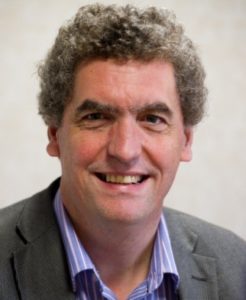 piano and bassoon, as well as viola and percussion, and composed small pieces from an early age. As principal bassoonist he toured to Canada and Russia with the Shropshire Schools Symphony Orchestra and instigated a series of chamber concerts in Shrewsbury in the early 1980’s under the banner “Mikrokosmos”.
piano and bassoon, as well as viola and percussion, and composed small pieces from an early age. As principal bassoonist he toured to Canada and Russia with the Shropshire Schools Symphony Orchestra and instigated a series of chamber concerts in Shrewsbury in the early 1980’s under the banner “Mikrokosmos”.
Charles studied Music at Sheffield University, specialising in Twentieth Century music and Composition. He was a finalist in the Huddersfield Young Composer’s Competition and attended the famous Internationale Ferienkurse für Neue Musik, Darmstadt in 1982 and 1984. He then completed a Master’s degree at King’s College, London under Jonathan Dunsby and Arnold Whittall.
Always interested in computers, Charles then undertook a successful IT career in Software Configuration Management for over 25 years, though continuing to write occasional pieces of music, including a wedding march for his own marriage, pieces for his children and arrangements for various odd combinations of instruments for school bands.
A change in circumstances led him back to composing more seriously from 2012 onwards, taking private lessons from Dr. Tom James, which has produced a flurry of new works. He now lives in Edinburgh.
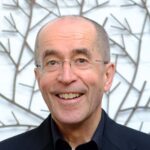 Born in 1951, Charles Hine’s distinguished and varied 50 year musical career includes roles as performer (clarinettist and percussionist), composer, conductor and musical educator.
Born in 1951, Charles Hine’s distinguished and varied 50 year musical career includes roles as performer (clarinettist and percussionist), composer, conductor and musical educator.
After studying at the Royal Academy of Music, London (1969-1973), in the 1970s and 80s Charles divided his time between performance and composition, and produced a varied output of vocal and chamber music, music for the theatre, and more experimental music. An early interest in the avant-garde led to exploration of instrumental performance with live electronics.
Achieving distinction as a solo and orchestral clarinettist, Charles has held principal positions with some of Britain’s leading orchestras including the BBC Orchestras in Bristol and Northern Ireland. Charles is a founder member of the Vega Wind Quintet, the first wind quintet to be invited to appear at the BBC Proms.
Later, Charles developed a career as a conductor of symphonic wind orchestras, concert bands and other groups including the British Clarinet Ensemble. He has taught in a wide range of establishments including posts in Rome and the Royal College of Music Junior Department, London.
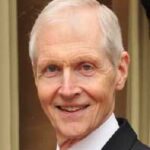 Charles Mackworth-Young started composing at the age of fourteen. His pieces are chiefly for brass, either for solo instruments or various combinations. Many of them blend old forms with new idioms. He has also made a large number of arrangements of classical pieces for children’s groups of varied ability. As a trombonist he was a student of Jack Pinches and he studied the piano with Richard James and Belle Dunhill. He plays trombones of various sizes as well as the bass trumpet. He has performed with a variety of orchestras including the Cambridge University Orchestra under Philip Ledger, the London Senior Orchestra under Terence Lovett and the Orchestra of the Royal Academy of Music under John Carewe. He was a founder member of the Pepys Brass Ensemble, with whom he has played in many locations in England and Scotland.
Charles Mackworth-Young started composing at the age of fourteen. His pieces are chiefly for brass, either for solo instruments or various combinations. Many of them blend old forms with new idioms. He has also made a large number of arrangements of classical pieces for children’s groups of varied ability. As a trombonist he was a student of Jack Pinches and he studied the piano with Richard James and Belle Dunhill. He plays trombones of various sizes as well as the bass trumpet. He has performed with a variety of orchestras including the Cambridge University Orchestra under Philip Ledger, the London Senior Orchestra under Terence Lovett and the Orchestra of the Royal Academy of Music under John Carewe. He was a founder member of the Pepys Brass Ensemble, with whom he has played in many locations in England and Scotland.
Christian F Natta was born on the 14th Of April of 1971, in Capital Federal, Buenos Aires, Argentina. He starts studying music since primary school. At the age of 15, started his first job as trumpet player in a 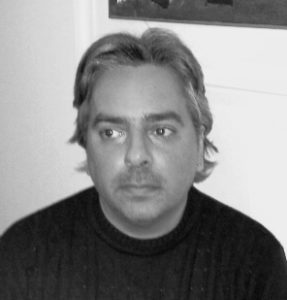 band, while studying at the Conservatory of Buenos Aires. Once he had finished School, he became a professional trumpeter and arranger, also travelling to United Kingdom, attending the University of London. He also made several trips to Scotland, Wales, France, Italy, USA, Denmark, Czechoslovakia, Spain, South America…and tried to take lessons in music and network with other musicians. He was invited then to USA, to assist The New York Philharmonic, and he founded there, a very inspiring and rich experience, and was astonished especially with the wind and brass sections. He continued studying in Argentina with Conductor and Composer Marcelo Ferreyra. He did many works as composer, conductor, and arranger with many local bands in the fields of rock, pop, R&B, musical comedy and classical and contemporary music. Since 1998, starts being published all over the world, and released some CD’s from his own original compositions. From a while up to nowadays, he’s focused on music for wind & brass.
band, while studying at the Conservatory of Buenos Aires. Once he had finished School, he became a professional trumpeter and arranger, also travelling to United Kingdom, attending the University of London. He also made several trips to Scotland, Wales, France, Italy, USA, Denmark, Czechoslovakia, Spain, South America…and tried to take lessons in music and network with other musicians. He was invited then to USA, to assist The New York Philharmonic, and he founded there, a very inspiring and rich experience, and was astonished especially with the wind and brass sections. He continued studying in Argentina with Conductor and Composer Marcelo Ferreyra. He did many works as composer, conductor, and arranger with many local bands in the fields of rock, pop, R&B, musical comedy and classical and contemporary music. Since 1998, starts being published all over the world, and released some CD’s from his own original compositions. From a while up to nowadays, he’s focused on music for wind & brass.
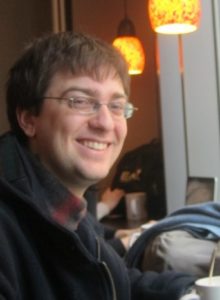 Claudio studied Composition at the conservatory “San Pietro a Majella” of Naples with Patrizio Marrone, and also studied Sax with Francesco Salime and Piano with Enrico Massa. In 2006 and 2007 two of his compositions were selected to be performed by the Ensemble Dissonanzen.
Claudio studied Composition at the conservatory “San Pietro a Majella” of Naples with Patrizio Marrone, and also studied Sax with Francesco Salime and Piano with Enrico Massa. In 2006 and 2007 two of his compositions were selected to be performed by the Ensemble Dissonanzen.
His first approach with music was with piano and harmony when he was a child. He has since expanded his musical attention to all kind of genres, including popular and commercial music, with a peculiar interest for the experiences of the Twentieth century and of the present.
Cormac Dorrian is a composer, arranger, songwriter and producer and has been working in the music industry for over 25 years. He studied at the Guildhall School of Music and Goldsmiths’ College as a 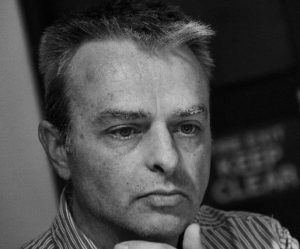 composer and conductor.
composer and conductor.
In the early 90’s, he was a session musician and producer, the mid 90’s a music associate for film composers including Barrington Pheloung, Richard Rodney Bennett and Maurice Jarre, in the late 90’s wrote music for TV, Radio and Film and since the early 2000’s has written music for library companies, chamber groups and soloists. In 2009, he worked for The Music and Media Partnership developing material for the World Cup and 2012 Olympics.
Cormac taught at Varndean College in Brighton from 2000 until 2012 and is now living in Salisbury and teaching Music and Performing Arts at Andover College.
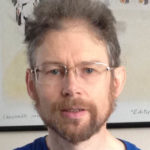 David Arditti was born in 1964, of mixed Jewish and Austrian descent, and brought up in Dorset on the south coast of England. Always keen on singing, after training for a scientific career, he eventually took up music full-time and now principally composes, plays the piano, and promotes concerts.
David Arditti was born in 1964, of mixed Jewish and Austrian descent, and brought up in Dorset on the south coast of England. Always keen on singing, after training for a scientific career, he eventually took up music full-time and now principally composes, plays the piano, and promotes concerts.
He has studied the piano with Peter Bithell of the Guildhall School of Music and Drama, and conducting with Neil Thompson of the Royal College of Music, Gregory Rose and George Hurst. As a composer he is largely self-taught.
His music is characteristically melodic and romantic. It is heavily influenced by the English composers and folk music, but also often has strong rhythmic drive influenced by 20th century minimalism and popular music styles.
Much of his output has consisted of of song-cycles and pieces for choir, both accompanied and unaccompanied, to texts by classic English, Scottish, Irish, and American poets. His largest vocal work is Chamber Music, a 30-minute long cycle of settings of James Joyce for tenor and chamber ensemble. He has also written settings for choir and orchestra of the Requiem and the Mass.
He has produced many works for orchestra, including two Ceremonial Marches, a Comic Overture, a Clarinet Concertino, and the Woodford Suite (written for Woodford Symphony orchestra), plus a march for brass band, and two marches for wind band.
In the chamber music line there have been two String Quartets, a Sonatina for wind ensemble, a Suite for brass quintet, Fantasia on a West-country Tune for brass quartet, and Introduction and Allegro Brillante for Flute, oboe and piano.
Smaller works include a Suite for guitar and many pieces for piano, including Six Songs Without Words, a New Wedding March, and the Grand Concert Rag: Marta. David has also composed for film.
David is Chair of the London Composers Forum, active in promoting the works of living composers in London. He is also well-known as an expert on astronomy, writing and lecturing extensively on the subject.
Born in Hyde, Cheshire in 1959 David began his path to a career in music learning the recorder at school, and later the flute.
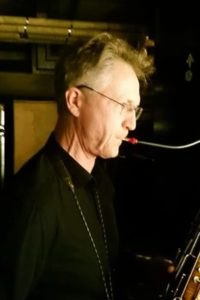 Whilst studying for his A levels he began lessons on a ‘derelict’ school bassoon and quickly advanced to the dizzy height of Grade VIII ABRSM having been awarded a scholarship from Tameside MBC to study with Charles Cracknel.
Whilst studying for his A levels he began lessons on a ‘derelict’ school bassoon and quickly advanced to the dizzy height of Grade VIII ABRSM having been awarded a scholarship from Tameside MBC to study with Charles Cracknel.
In 1978 David moved to the Music department of Huddersfield Polytechnic, studying with Richard King (Charles Cracknel’s successor as principal bassoon with the Halle Orchestra) and specialising in performance and composition. He performed in the Huddersfield Contempory Music Festival and played concerti with various orchestras. In his final year he was awarded the J C Forbes performance prize as well as gaining his B.A. (hons) mus.
After a further two years post graduate study at the RNCM (supported by a scholarship from the Countess of Munster Trust Fund) and under the tutelage of Edward Warren (principal bassoon with the Royal Liverpool Philharmonic Orchestra) David gained a PG dip.(RNCM) in orchestral studies and joined the Miladi ensemble, with whom he performed a wide variety of music for wind and piano and gave a Wigmore Hall recital.
In the following years David worked as a session musician with Granada Television and the BBC (radio and television), as well as freelancing with all the Northern based symphony and chamber orchestras; playing principal bassoon with the BBC Philharmonic and the Royal Liverpool Philharmonic Orchestras. He also undertook longer term contracts in the Manchester theatres.
David was appointed as principal bassoon with The Northern Chamber Orchestra in 1985 and two years later (and running concurrently) as principal bassoon of The Orchestra of the Golden Age (playing on ‘original’ instruments).
In 1991 David became sub principal bassoon with The Orchestra of Opera North based in Leeds, a post he holds to this day; enjoying a wide variety of orchestral, chamber and opera performance in the roll of both first and second bassoon.
David has taught bassoon at Leeds College of Music, Hull University, and Breton Hall College. He now teaches privately, at Huddersfield and Leeds Universities, and also for Yorkshire Young Musicians.
In recent years David has renewed his interest in composition and has had works performed in university recitals, the International Double Reed Society convention and has also had works commissioned. He has also produced a recording of some of his chamber works.
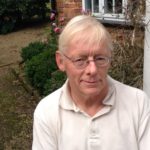 David Bevan is Director of Music at the Catholic Church of Our Most Holy Redeemer and St Thomas More in Chelsea which boasts a fine choir specializing in Renaissance polyphony. He was educated at Westminster Cathedral Choir School, Downside and The Queen’s College, Oxford. He has worked as a singer, organist teacher and conductor and was assistant Master of the Music at Westminster Cathedral from 1972 to 1976. In 1997 he gained an Oxford B. Mus in composition and has published choral and wind music including sonatas for clarinet and oboe. His settings of the latin Magnificat are widely performed and occasionally broadcast from English cathedrals. He is the father of the opera singers Sophie and Mary Bevan and the brother of Benjamin Bevan.
David Bevan is Director of Music at the Catholic Church of Our Most Holy Redeemer and St Thomas More in Chelsea which boasts a fine choir specializing in Renaissance polyphony. He was educated at Westminster Cathedral Choir School, Downside and The Queen’s College, Oxford. He has worked as a singer, organist teacher and conductor and was assistant Master of the Music at Westminster Cathedral from 1972 to 1976. In 1997 he gained an Oxford B. Mus in composition and has published choral and wind music including sonatas for clarinet and oboe. His settings of the latin Magnificat are widely performed and occasionally broadcast from English cathedrals. He is the father of the opera singers Sophie and Mary Bevan and the brother of Benjamin Bevan.
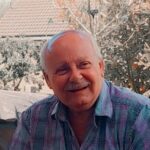 David was born in Alverstoke, Hampshire studied at Goldsmith’s College in London, and has been a Music Teacher in schools for 30+ years, and a Director of Music in 4.
David was born in Alverstoke, Hampshire studied at Goldsmith’s College in London, and has been a Music Teacher in schools for 30+ years, and a Director of Music in 4.
His main musical passion is working with young people, in choirs, orchestras and through individual instrumental and vocal teaching. He is an examiner with the London College of Music (University of West London), and in retirement spends his time examining, accompanying, composing and arranging, and playing the organ. He is currently conducting research into class music teaching, with particular reference to Kodaly and Orff pedadgogy, and aims to create a work to support todays’ class music teacher
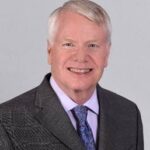 David Maxwell holds degrees in both piano and organ from the University of Illinois at Urbana-Champaign, where he was named to membership in Pi Kappa Lambda, music honor society. At the U of I, Maxwell studied composition with Ben Johnston and Edwin London, piano with Malcolm Bilson, and organ with Jerald Hamilton. During his years as a graduate student, he was a member of Ineluctable Modality, Edwin London’s vocal ensemble which sang new music. Dr. Maxwell has served on the music faculties of Western Illinois University and the University of Southern Maine. He has played with the Saint Louis Symphony Orchestra and the Portland (Maine) Symphony Orchestra in addition to having done much solo and chamber music performing. Dr. Maxwell serves as Minister of Music at State Street Church, UCC in Portland Maine, where he plays an 1893 Frank Roosevelt organ and a 1914 Steinway model A piano in addition to conducting the choir. When recording piano music for online services, he often plays his Rococo style 1854 Chickering square grand while seated on his William IV piano stool. Publishers of Dr. Maxwell’s music include H. W. Gray, Concordia Publishing House, Augsburg Fortress, MorningStar Music, and Zimbel Press.
David Maxwell holds degrees in both piano and organ from the University of Illinois at Urbana-Champaign, where he was named to membership in Pi Kappa Lambda, music honor society. At the U of I, Maxwell studied composition with Ben Johnston and Edwin London, piano with Malcolm Bilson, and organ with Jerald Hamilton. During his years as a graduate student, he was a member of Ineluctable Modality, Edwin London’s vocal ensemble which sang new music. Dr. Maxwell has served on the music faculties of Western Illinois University and the University of Southern Maine. He has played with the Saint Louis Symphony Orchestra and the Portland (Maine) Symphony Orchestra in addition to having done much solo and chamber music performing. Dr. Maxwell serves as Minister of Music at State Street Church, UCC in Portland Maine, where he plays an 1893 Frank Roosevelt organ and a 1914 Steinway model A piano in addition to conducting the choir. When recording piano music for online services, he often plays his Rococo style 1854 Chickering square grand while seated on his William IV piano stool. Publishers of Dr. Maxwell’s music include H. W. Gray, Concordia Publishing House, Augsburg Fortress, MorningStar Music, and Zimbel Press.
David Osbon is a composer, conductor and academic whose music has been performed, broadcast and recorded around the world. Most of this international recognition comes from the years he spent as a researcher and professor in cities as diverse as Philadelphia, The 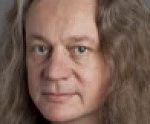
He has conducted ensembles and orchestras ranging from the Bulgarian Radio Symphony Orchestra and the Jordanian Army Band through to the Bremmerton Symphony Orchestra and he has toured across Europe the USA and the Middle East with a variety of ensembles. An acclaimed expert in multi-media performance he is a pioneer in multi-platform and transmedia environments for contemporary performance. David is Professor of the Creative Arts at the University of West London.
Since returning to the UK in 2000 David has, in addition to his musical work, held lecturing roles at the University of London, South Bank University and Rose Bruford College, whilst holding down a full-time role as Head of Arts and Culture at Greenwich Council where he was instrumental in, amongst other things, devising the cultural chapter of the 2012 Olympic Bid. Commissions from the Bergamo Ensemble, Docklands Sinfonietta, Blackheath String Orchestra and the Dartford Symphony Orchestra have yielded major works, plus a number of chamber music commissions have been premiered, to critical acclaim in venues ranging from St. John’s Smith Square and the Wigmore Hall through to the Purcell Room and the Royal Albert Hall. www.davidosbon.com
The music of composer David S. Bernstein has seen its expression in a wide variety of genres. His concert music ranges from compositions for the theatre and 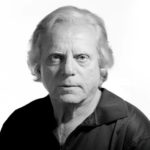 musical theatre to works for dance, opera, orchestra, chorus, band and many varied chamber music ensembles.
musical theatre to works for dance, opera, orchestra, chorus, band and many varied chamber music ensembles.
His music has been performed in many areas of the United States, Canada, South America, and Europe. He has travelled widely and given lectures on his music in Vienna, Paris, Warsaw, Posnan, Crakow, The Eastman School of Music, The University of Alberta, The University of Southern California, New York University, The University of Kentucky, and many others. His music has been published by G. Schirmer, Acoma Productions, Ludwig Music Publications, Willis Music, Abingdon Press, Lawson-Gould, Dorn Productions, Music for Percussion, Inc., Clear Note Publications and Forton Music Publications (England).
Dr. Bernstein moved to the Portland, Oregon area in 2006, a move that he describes as being one of the best decisions of his life. Since coming to this region, he has joined a group called CASCADIA COMPOSERS in which he is active as an organizer for new music concerts. He continues his work as a free-lance composer.
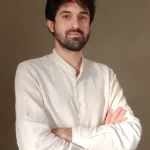 Born in 1989, Davide Riva is an accomplished Italian composer. His journey in music began with a graduation in composition at the G. Verdi Conservatory in Como, where he had the privilege of being mentored by Maestro Carlo Ballarini and Maestro Antonio Eros Negri.
Born in 1989, Davide Riva is an accomplished Italian composer. His journey in music began with a graduation in composition at the G. Verdi Conservatory in Como, where he had the privilege of being mentored by Maestro Carlo Ballarini and Maestro Antonio Eros Negri.
Following his degree, Riva continued to refine his musical talents under the guidance of the renowned composer Luis Bacalov at the Accademia Chigiana in Siena. He further honed his skills by enrolling in the advanced musical composition program at the “Accademia Filarmonica di Bologna,” studying under the tutelage of Maestro Azio Corghi and Maestro Mauro Bonifacio.
Beyond classical composition, he expanded his expertise in songwriting techniques through his studies at CET, an academy established by the esteemed lyricist Mogol.
Riva’s dedication and artistic prowess have earned him recognition in various competitions, including the National Choral Composition Competition “L’Italia s’è desta,” the National Choral Composition Competition “Accademia Corale Veneta,” and the International Choral Composition Competition “Virgo Vox.”
His diverse portfolio showcases compositions for choirs, orchestras, chamber ensembles, and dance productions. Since 2015, Riva has been imparting his knowledge and passion for music theory and harmony as a dedicated educator at the Municipal School of Music “Antonio Guarnieri” in Casatenovo, located in Northern Italy.
 While still in his teens, Denis Betro came to the UK from New Zealand to study music at the Royal College of Music. He supported himself in this endeavour by busking on the streets of London for two years. He went on to master orchestration and had his first piece, Concerto for Electric Guitar, performed with the Kensington Symphony Orchestra with himself performing the solo part. In 1989, he founded Orchestra of the Twentieth Century, a fully professional body which gave its first performance at the Mermaid Theatre, London. Betro’s Symphony No. 1 was premiered at this concert conducted by Lionel Friend. In 1999, Betro was appointed Composer in Residence for the Oxford Orchestra da Camera. His association with them produced three world-premières of major orchestral works in 1999, 2000 and 2001, with Benjamin Zander conducting Back at Charlie’s House eleven times during a European tour by the orchestra. Other notable works include Seascapes for chorus and orchestra, which creates a wonderful evocation of four salty periods from New Zealand’s maritime history. It is an accessible work and is dedicated to the people of New Zealand. It is in four movements with the following titles: Kupe, Captain Cook, Whalers and Sealers, Auckland: City of Sails. The first movement is sung in the Maori language and features Maori instruments. Kitchen Koncerto was written for the percussion ensemble Brake Drum Assembly. It was voted the best piece at the 2005 All Ears Festival in London. In 2010, Betro began to write a challenging new musical based on anecdotes and experiences of the Palestinian people living under occupation. Daughters of Abraham was showcased in 2011 at the Jermyn Street Theatre in the West End and received overwhelming praise from the audience via the returned questionnaires. It also attracted the attention of the Egyptian, Lebanese and Jordanian embassies which sent their respective Cultural Attaches to offer support.
While still in his teens, Denis Betro came to the UK from New Zealand to study music at the Royal College of Music. He supported himself in this endeavour by busking on the streets of London for two years. He went on to master orchestration and had his first piece, Concerto for Electric Guitar, performed with the Kensington Symphony Orchestra with himself performing the solo part. In 1989, he founded Orchestra of the Twentieth Century, a fully professional body which gave its first performance at the Mermaid Theatre, London. Betro’s Symphony No. 1 was premiered at this concert conducted by Lionel Friend. In 1999, Betro was appointed Composer in Residence for the Oxford Orchestra da Camera. His association with them produced three world-premières of major orchestral works in 1999, 2000 and 2001, with Benjamin Zander conducting Back at Charlie’s House eleven times during a European tour by the orchestra. Other notable works include Seascapes for chorus and orchestra, which creates a wonderful evocation of four salty periods from New Zealand’s maritime history. It is an accessible work and is dedicated to the people of New Zealand. It is in four movements with the following titles: Kupe, Captain Cook, Whalers and Sealers, Auckland: City of Sails. The first movement is sung in the Maori language and features Maori instruments. Kitchen Koncerto was written for the percussion ensemble Brake Drum Assembly. It was voted the best piece at the 2005 All Ears Festival in London. In 2010, Betro began to write a challenging new musical based on anecdotes and experiences of the Palestinian people living under occupation. Daughters of Abraham was showcased in 2011 at the Jermyn Street Theatre in the West End and received overwhelming praise from the audience via the returned questionnaires. It also attracted the attention of the Egyptian, Lebanese and Jordanian embassies which sent their respective Cultural Attaches to offer support.
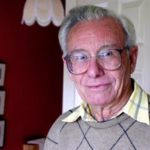 Born near Croydon in 1926, Dennis Wickens, like many musicians, developed an early enthusiasm for music as a chorister in his local parish church choir. Having to spend much of his younger life as a civil servant, he took piano and theory lessons privately. Continuing to sing, he took the opportunity to become a member of the choir of the Festival of Britain church, then that of the Queen’s Chapel of the Savoy, and to deputise at St. Paul’s Cathedral. Further part-time studies led to a degree scholarship at Trinity College of Music, London, where his tutors were William Lovelock, Arnold Cooke and Richard Arnell. He conducted several choirs, including that of the then Ministry of Education, and subsequently became director of music at the Worcester Royal Grammar School, combining this post with that of lay clerk in the choir of Worcester Cathedral and lecturing for the extra-mural department of Birmingham University.
Born near Croydon in 1926, Dennis Wickens, like many musicians, developed an early enthusiasm for music as a chorister in his local parish church choir. Having to spend much of his younger life as a civil servant, he took piano and theory lessons privately. Continuing to sing, he took the opportunity to become a member of the choir of the Festival of Britain church, then that of the Queen’s Chapel of the Savoy, and to deputise at St. Paul’s Cathedral. Further part-time studies led to a degree scholarship at Trinity College of Music, London, where his tutors were William Lovelock, Arnold Cooke and Richard Arnell. He conducted several choirs, including that of the then Ministry of Education, and subsequently became director of music at the Worcester Royal Grammar School, combining this post with that of lay clerk in the choir of Worcester Cathedral and lecturing for the extra-mural department of Birmingham University.
During those years several of his works received a number of performances, two at the Three Choirs Festival and one at the Cheltenham Festival, the latter his song cycle, The Everlasting Voices, performed by Ian and Jennifer Partridge who subsequently broadcast it. His first cycle, Five Songs for Tenor and Orchestra, written for Gerald English, was performed by him several times with Orchestra da Camera, who then commissioned and performed a Double Concerto for Violin and Harmonica, and Sinfonia. A long period spent as music adviser to two local education authorities left little time for composition, but in 1987 a sabbatical term enabled him to study with the late John McCabe, culminating in Symphony for Brass Band, the scoring for which includes two additional trumpet choirs, piano, and percussion. This was first performed at the RNCM under Timothy Reynish.
His output has grown to include more orchestral, chamber, choral, keyboard and vocal music. His sixth song cycle, The Heart Oppressed, to poems by Thomas Wyatt, has been recorded by Jeremy Huw Williams and Nigel Foster for the English Poetry and Song Society, and his seventh, This Life, to poems by W. H. Davies, by Johnny Herford and Nigel Foster on the Divine Art label. His latest cycle, Mountains of the Mind, sets five texts by various writers for high voice and orchestra. A number of organ and choral pieces are published by Fagus Music.
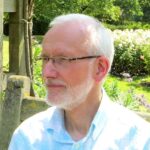 Derek Foster gained his BMus from Goldsmiths College as a mature student, after various evening classes at Morley College. He currently teaches music in West London and plays piano and vibraphone, encouraging many composers to write for the latter instrument. He has given numerous first performances as soloist and in various ensembles, most recently with the contemporary/experimental ensemble Contakt, and in a long-standing duo with composer/pianist Anthony Green. Derek enjoys writing music in a more tonal idiom, as in ‘Saturn’, and also atonal and more complex music, sometimes incorporating indeterminacy.
Derek Foster gained his BMus from Goldsmiths College as a mature student, after various evening classes at Morley College. He currently teaches music in West London and plays piano and vibraphone, encouraging many composers to write for the latter instrument. He has given numerous first performances as soloist and in various ensembles, most recently with the contemporary/experimental ensemble Contakt, and in a long-standing duo with composer/pianist Anthony Green. Derek enjoys writing music in a more tonal idiom, as in ‘Saturn’, and also atonal and more complex music, sometimes incorporating indeterminacy.
Domenico Falanga is an Italian composer born in NoceraInferiore, Italy in 1978. He graduated from the Conservatoryof Salerno and Avellino (Italy) in Trombone, band instrumentation, Composition and Jazz.
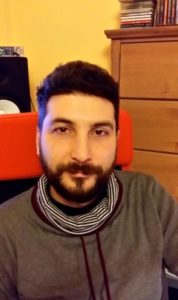
He studied composition with the mastersGaetano Panariello, Enrico Renna, AnneMarie Turcotte and Vincenzo Palermo. He performs as a trombonist, pianist, as well as being an arranger and conductor.
He has played with well-known Italian jazz musicians and artists of national pop music, participating in numerous Italisan jazz festivals. In 2005 he participated in the essay competition “A fable in music” launched by the Teatro SanCarlo in Naples.
Since 2009 he has been teaching music in secondary school, from 2015 he is a piano teacher at the primary school ofScafati (SA), Italy. He works as a teacher and director of the band of Scafati (SA), Italy, the country in which he lives. He has had several performances of his chamber workscommissioned from leading Italian musicians.
He has participated as a trombonist in the recordings ofItalian jazz musicians including Bruno Tommaso and MariaPia De Vito, and has written soundtrack for a film by a director in London.
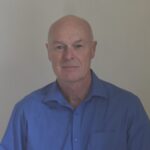 Ed Heslam is a composer and classical guitarist who worked for many years as Head of Music in a number of West Country schools, first in Devon then later in Bristol. During this time he wrote and produced many musicals and composed music for contemporary dance projects. He wrote incidental music for Alice Through the Looking Glass and for a production of Romeo and Juliet. He arranged music for the orchestra, for strings and for wind band. In Devon, Ed was a member of an early music group and a folk/ceilidh band. On moving to Bristol he used this experience to set up school folk bands, using some of his written arrangements of traditional dance music.
Ed Heslam is a composer and classical guitarist who worked for many years as Head of Music in a number of West Country schools, first in Devon then later in Bristol. During this time he wrote and produced many musicals and composed music for contemporary dance projects. He wrote incidental music for Alice Through the Looking Glass and for a production of Romeo and Juliet. He arranged music for the orchestra, for strings and for wind band. In Devon, Ed was a member of an early music group and a folk/ceilidh band. On moving to Bristol he used this experience to set up school folk bands, using some of his written arrangements of traditional dance music.
After retiring from teaching, Ed moved back to Cumberland, the county of his birth, where he started researching old music manuscripts. He found a great deal of interesting, unpublished material in the tunebooks of 18th and 19th century fiddle players and a wealth of old songs long-forgotten in the county (except by a few aficionados). Initially, he created arrangements, for solo guitar then guitar and harp (after forming a duo with former orchestral harpist Jean Altshuler). These initial arrangements of old Cumbrian music were an attempt to recreate something akin to the original performance style of the music. Latterly, he has taken the view that the old melodies can be developed into new music and set into a new context. He has arranged many of the songs of Susanna Blamire (1747 – 1794) and Robert Anderson (1770 – 1833) and created new compositions inspired by the Cumbrian landscape and the stories of its people.
He has produced three CDs of Cumbrian music.
Music of Cumberland and Westmorland – solo guitar arrangements of old Cumbrian tunes, performed by Ed Heslam.
Hunsup Through the Wood – original music and arrangements of old Cumbrian tunes, performed by Ed Heslam (guitar) and Jean Altshuler (harp).
Bleckell Murry Neet – original music and arrangements of old Cumbrian tunes, performed by Ed Heslam and Jean Altshuler
Elizabeth Aitken was born in 1949 and began writing tunes and mini-pieces on the piano from the age of five. Her parents encouraged her efforts at home, school and Teachers’ Training College. She learnt to sing and play a number of instruments and now belongs to an orchestra and small choir. From first hearing she liked the sound of the oboe and cor anglais and was influenced by oboist Roger Lord and his late composer wife Madeleine Dring, who were family friends.
Emanuel Vahl was born in Odessa (Ukraine) in 1938. After ending his musical studies at the Stoliarsky Conservatory in Odessa and the Music Academy in Moscow, he started to compose for all kind of instruments and ensembles. So 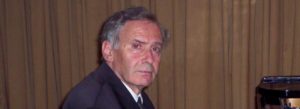 far, he has composed more than 100 works for groups of all sizes. In 1990, he made his Aliya to Israel. He taught Harmony and Composition at the Conservatory “Hasadna” in Jerusalem, and now he teaches at the Dance Studio of Jerusalem. He has been a member of the Union of Israeli Composers and AQUM since 1991.
far, he has composed more than 100 works for groups of all sizes. In 1990, he made his Aliya to Israel. He taught Harmony and Composition at the Conservatory “Hasadna” in Jerusalem, and now he teaches at the Dance Studio of Jerusalem. He has been a member of the Union of Israeli Composers and AQUM since 1991.
Ernest Tomlinson 1924 – 2015. Composer, arranger and conductor Ernest Tomlinson was born in Rawtenstall, Lancashire, and encouraged in music from an early age. His school education took place at the Manchester Cathedral Choir School after winning a 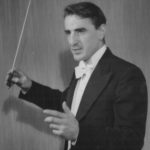 scholarship. Aged 16 Tomlinson won another scholarship from Manchester University to study composition as well as organ, piano and clarinet at the Royal Manchester College of Music, graduating in 1947 and also acquiring his FRCO. Whilst working as an organist in Mayfair and as a music copyist and arranger for a London music publishing firm, his own compositions began to attract interest. The first broadcast of his music was in 1949 and soon his increasing success enabled him to support himself and his family solely as a composer. His music became much in demand by the BBC and he received numerous commissions for works. Many of his compositions were used as background music or as signature tunes, and he wrote library music that is still used by TV and radio producers the world over. In the mid 1950s he also broadcast regularly with his own ensemble, the Ernest Tomlinson Orchestra and Singers, and was in demand as a conductor, recording many studio orchestra recordings of other composers’ works, often his own arrangements.
scholarship. Aged 16 Tomlinson won another scholarship from Manchester University to study composition as well as organ, piano and clarinet at the Royal Manchester College of Music, graduating in 1947 and also acquiring his FRCO. Whilst working as an organist in Mayfair and as a music copyist and arranger for a London music publishing firm, his own compositions began to attract interest. The first broadcast of his music was in 1949 and soon his increasing success enabled him to support himself and his family solely as a composer. His music became much in demand by the BBC and he received numerous commissions for works. Many of his compositions were used as background music or as signature tunes, and he wrote library music that is still used by TV and radio producers the world over. In the mid 1950s he also broadcast regularly with his own ensemble, the Ernest Tomlinson Orchestra and Singers, and was in demand as a conductor, recording many studio orchestra recordings of other composers’ works, often his own arrangements.
Tomlinson’s work has received much recognition. His jazz symphony ‘Sinfonia 62’ won first prize at a prestigious competition in Italy, he received a Composers’ Guild Award in 1966 and he won an Ivor Novello award in 1969 for ‘Outstanding Light Orchestral Arranger/ Composer’, winning another in 1974 for ‘Best Light Orchestral Work’.
Tomlinson received an MBE from Her Majesty the Queen on October 19th 2012, for services to music.
Much of Tomlinson’s work is light-orchestral, most famously the miniature Little Serenade, the immensely popular Suite of English Folk-Dances and Fantasia on “Auld Lang Syne”, all played frequently on Classic FM. Other notable works include two jazz symphonies, three concertos, two ballets, a one-act opera, marches for brass and wind bands, and many songs for both soloists and choirs.
For full details of any performing material of Ernest Tomlinson’s orchestral works please contact Hilary Ashton, Electrophonic Music Company, Lancaster Farm, Chipping Lane, Longridge, Preston, PR3 2NB [email protected] www.ernesttomlinson.co.uk
Composer Eugene Magalif (b. 1957, Vitebsk, Belarus), has lived in the USA since 1990. He graduated from Vitebsk Music College and Belarusian State Conservatory (Academy of Music). During the years in 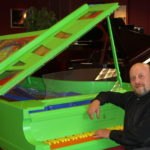 Belarus, E. Magalif became well-known for his pop-songs and music for children. Many of them were recorded by famous singers and orchestras from different countries and featured on Radio and TV. As of today, his compositions are performed in Argentina, Armenia, Austria, Belarus, Bulgaria, Brasil, Czech Republic, Estonia, Finland, France, Germany, Hungary, Israel, Italy, Lithuania, Mexico, Moldova, Poland, Russia, Ukraine, USA etc.
Belarus, E. Magalif became well-known for his pop-songs and music for children. Many of them were recorded by famous singers and orchestras from different countries and featured on Radio and TV. As of today, his compositions are performed in Argentina, Armenia, Austria, Belarus, Bulgaria, Brasil, Czech Republic, Estonia, Finland, France, Germany, Hungary, Israel, Italy, Lithuania, Mexico, Moldova, Poland, Russia, Ukraine, USA etc.
Eugene Magalif is the author of the musical «Swineherd», cantata «Barmaley», music for Theater, Radio, and TV, instrumental pieces, Christian music for the choir, and popular songs and ballads. His piece for flute and piano «Autumn» was chosen as mandatory piece for Children International Competition «My Favorite Flute» (Moscow, 2012). In 2012 “Spring” and “Summer” for Piano 4 hands were chosen as mandatory pieces for Children’s Piano Duets Contest in Poland.
Dr Frances Jones is a freelance woodwind and French horn player based the Thames Valley, UK, particularly sought after as a performer, teacher, lecturer, adjudicator, arranger and writer.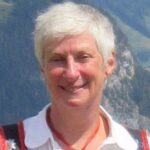
She took a music degree at the University of Reading and studied oboe with Sydney Sutcliffe at the Royal College of Music. Since 2005 she has become the UK’s leading exponent of the Swiss alpine horn, which has resulted in engagements to perform and lecture regularly not only throughout the Alps and across Western Europe, but also in South Africa, Taiwan, Guatemala, Peru and Bolivia. Research projects about the instrument have included the recent completion of a ground-breaking PhD about the influence of the alphorn on the classical composer, which has led to a fascinating book ‘The alphorn through the eyes of the classical composer’ due for publication by Vernon Press in 2020. Frances’s talent as an insightful arranger of music for various combinations of instruments displays not only a detailed knowledge of the sounds, colours, capabilities and subtleties of the instruments chosen, but also a deep passion for a range of musical genres and a desire to enable players of various abilities to enjoy a broad variety of beautiful music.
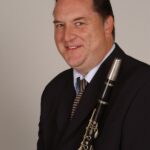 Frank Griffith is an American saxophonist/clarintettist and composer/arranger He has written for the Ron Carter Nonet, the Lionel Hampton Orchestra, and the Jon Hendricks Explosion as well as the Blue Wisp Big Band and the Brooklyn Philharmonic Orchestra and clarinettist, Eddie Daniels. He has received composition commissions from the Ealing and Coventry Jazz Festivals, the Cardinal Vaughan Memorial School Big Band, the Oakham School Big Band, the Midlands Youth Jazz Orchestra and AMIS (The Association for Music in International Schools) for their annual Honours Jazz Festival.
Frank Griffith is an American saxophonist/clarintettist and composer/arranger He has written for the Ron Carter Nonet, the Lionel Hampton Orchestra, and the Jon Hendricks Explosion as well as the Blue Wisp Big Band and the Brooklyn Philharmonic Orchestra and clarinettist, Eddie Daniels. He has received composition commissions from the Ealing and Coventry Jazz Festivals, the Cardinal Vaughan Memorial School Big Band, the Oakham School Big Band, the Midlands Youth Jazz Orchestra and AMIS (The Association for Music in International Schools) for their annual Honours Jazz Festival.
He has two compositions published in the Associated Boards Jazz Works ensemble series as well as two pieces for their Jazz Saxophone Syllabus. His clarinet and strings quintet piece Round About, was published by Really Good Music as well as two big band pieces published by the University of Northern Colorado Press. He currently has six big band charts published with www.ijazzmusic.com.
Frank organised and curated two String Quartet Festivals at Pizza Express in London in 2014 and 2015. These events featured well known performers like Liane Carroll, Gwilym Simcock, Empirical, Gilad Atzmon, The London Vocal Project, Julian Stringle and Tina May with a resident string quartet.
Frank held a fulltime music lectureship at Brunel University from 1997-2017. He directed several ensembles from clarinet and saxophone quartets to big bands. This required composing, arranging and adapting charts for the ensembles on a regular basis.
Frank moved to Liverpool in 2018 and performs with his own groups which include a quartet, nonet and big band as well as his saxophone quartet, Saxtivity. Their CD-No Deal, was recorded in 2020 and includes several of his compositions as well as pieces by noted British composers, Dick Walter and John Warren. He also leads The Penny Lane Jazz Workshop which meets weekly in Liverpool.
Fredrik Holm has an MA in music from the University (College) of Lund in the south of Sweden with further studies in Stockholm, Copenhagen and Berlin. Fredrik has worked 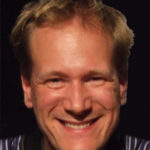 professionally in Sweden, Denmark and the UK as a musician, conductor and teacher since 1994. He worked for many years with The Malmö Opera House, Helsingborgs Symphony Orchestra, Den Anden Opera (in Copenhagen), The Swedish Improvising Theatre, The Danish Chamber Orchestra, The Swedish Bassoon Quartet.
professionally in Sweden, Denmark and the UK as a musician, conductor and teacher since 1994. He worked for many years with The Malmö Opera House, Helsingborgs Symphony Orchestra, Den Anden Opera (in Copenhagen), The Swedish Improvising Theatre, The Danish Chamber Orchestra, The Swedish Bassoon Quartet.
Fredrik moved to England in 2005. He started working as a self employed musician/facilitator to be able to help people through his music, finding the many ways that it could suit those who are interested in sound through a holistic approach. He has held self development workshops through the International School of Awareness, composed CDs, produced and toured theatre shows for children, led choirs and orchestras, composed music for films and theatre and been teaching music one to one and in group.
For more information see Fredrik’s website www.2b-intune.com
 Garry Wilkinson was born in London and was educated at Margo Fagan’s Young Music Makers, the Centre for Young Musicians, the London Schools’ Symphony Orchestra and at the University of London’s Trinity College of Music, the Royal Academy of Music and the Royal College of Music. He is a Fellow of Trinity College London in music composition (FTCL).
Garry Wilkinson was born in London and was educated at Margo Fagan’s Young Music Makers, the Centre for Young Musicians, the London Schools’ Symphony Orchestra and at the University of London’s Trinity College of Music, the Royal Academy of Music and the Royal College of Music. He is a Fellow of Trinity College London in music composition (FTCL).
As a professional freelance trombonist, Garry played with Glyndebourne Opera, Dorset Opera, the John Wilbraham Brass Ensemble, the Bournemouth Sinfonietta and the Bournemouth Symphony Orchestra, among others. He taught music at several schools and colleges with many of his former students now professional musicians and composers.
His many compositions include orchestral, choral, music-theatre, opera, chamber and solo works. Three pieces were performed by the Bournemouth Symphony Orchestra with Richard Hickox, Maxime Tortelier and Patrick Shelley conducting as part of the winning prize in the Six Counties Festival composition competition (UK). The Kokoro ensemble performed one of his chamber works as part of the call-for-scores 2013 competition. Four Piano pieces were performed in the 2017 finals of the Grieg International Piano Competition for youth in Oslo, Norway. In the same year, he won first prize in the Busan Maru (South Korea) International Music Festival competition for orchestral composition. He is the recipient of the Honourable Mention Award in the Ravel international competition for orchestral composition, Milan, Italy (2018) and winner of the West Wicklow Festival for chamber music composition competition, Ireland (2021). Elizabeth Jacoby premiered his Cor Anglais Sonatina and Karen Evans premiered his Flute Concerto with the Sherborne Community Orchestra (1998). Garry’s solo music for Piano, Brass and Violin appear in UK examination grade and recital diploma syllabuses.
Geoff Warren is a prominent exponent of Jazz, contemporary music and ethnic crossover. A graduate from London University, he studied flute with Derek Honner at the Royal Academy of Music.
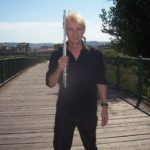 He started his career as a jazz flautist/saxophonist, performing alongside a plethora of famous musicians. His work includes many compositions, recordings, concert tours and teaching and writing about jazz. He presents masterclasses and workshops throughout Europe, and is a Yamaha Artist.
He started his career as a jazz flautist/saxophonist, performing alongside a plethora of famous musicians. His work includes many compositions, recordings, concert tours and teaching and writing about jazz. He presents masterclasses and workshops throughout Europe, and is a Yamaha Artist.
Graham Lynch’s music has been performed, recorded and broadcast, by leading orchestras and ensembles in over thirty countries, 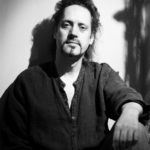 including the BBC Symphony Orchestra, BBC National Orchestra of Wales, Orchestra of Opera North, and the BBC Singers. His works have been played in venues as diverse as the South Bank, Wigmore Hall, the Barbican, Merkin Hall New York, Paris Conservatoire, Palace of Monaco, and from the Freiberg Jazz Club to a cake shop in Japan, and everything in between. Graham’s output includes orchestral and chamber pieces, as well as compositions that have been influenced by styles such as tango and flamenco.
including the BBC Symphony Orchestra, BBC National Orchestra of Wales, Orchestra of Opera North, and the BBC Singers. His works have been played in venues as diverse as the South Bank, Wigmore Hall, the Barbican, Merkin Hall New York, Paris Conservatoire, Palace of Monaco, and from the Freiberg Jazz Club to a cake shop in Japan, and everything in between. Graham’s output includes orchestral and chamber pieces, as well as compositions that have been influenced by styles such as tango and flamenco.
Born in England to Irish parents, Graham Nelson has lived and worked in N. Ireland for most of his life. He holds BMus and MA degrees from Queen’s University, Belfast; during his undergraduate days he studied composition with Professor Raymond Warren, and 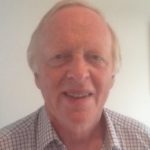 his main instrument was the cello. A year enrolled on a music education course at the University of Reading (including a conducting masterclass with Nadia Boulanger) resulted in the award of a Postgraduate Certificate in Education. This led to his first appointment as a music teacher with Leicestershire Education Authority. Over the next three years, he gained invaluable experience in relation to teaching music at secondary and post-16 levels, performing on cello and engaging with school audiences as a member of staff string quartet, arranging music for small ensembles (mainly string and brass), and organising and conduction an area youth orchestra in north Leicestershire. He then returned to N. Ireland following his appointment as Lecturer in Music at the then Ulster Polytechnic (later to become the University of Ulster). In addition to his academic duties, his commitment to practical music-making resulted in the establishment firstly, of the University Orchestra and later of the Concert Band. His early retirement in 2006 has enabled him to focus on arranging and composing music specifically for young players of limited technical and musical experience; a number of these works have been published in the UK with more in the pipeline.
his main instrument was the cello. A year enrolled on a music education course at the University of Reading (including a conducting masterclass with Nadia Boulanger) resulted in the award of a Postgraduate Certificate in Education. This led to his first appointment as a music teacher with Leicestershire Education Authority. Over the next three years, he gained invaluable experience in relation to teaching music at secondary and post-16 levels, performing on cello and engaging with school audiences as a member of staff string quartet, arranging music for small ensembles (mainly string and brass), and organising and conduction an area youth orchestra in north Leicestershire. He then returned to N. Ireland following his appointment as Lecturer in Music at the then Ulster Polytechnic (later to become the University of Ulster). In addition to his academic duties, his commitment to practical music-making resulted in the establishment firstly, of the University Orchestra and later of the Concert Band. His early retirement in 2006 has enabled him to focus on arranging and composing music specifically for young players of limited technical and musical experience; a number of these works have been published in the UK with more in the pipeline.
Helmuts Feldmanis started his music studies at the Children’s Music School in Roja, Latvia. He began to learn to play the trombone, the baritone horn and the piano, and also took classes in 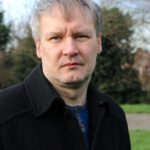 music theory and history. During his studies he became involved in the Wind Symphonic orchestra, the school’s Jazz Band and many different chamber ensembles. Along side this, he sang in the student’s choir and the mixed voice choir, gaining valuable exposure to a large classical choral repertoire. He then continued his music studies at the Music College of Jelgava in Latvia, graduating in 2005 in orchestral conducting, ensemble and orchestral playing, academic singing and piano. Whilst at college, he won third place in a trombone competition and first place in an orchestral conducting contest held by the Music Academy of Latvia. At the same time, his piano compositions were nominated for the New Composers award. On finishing his studies, Helmuts was employed as a trombone player in a professional Wind Orchestra before moving to England in 2006, where he founded and became musical director of the Latvian chamber choir ‘Novadi’. The choir has performed his music in many churches in England. He is currently studying composition at the Open College of Arts with Dr. Andrew Glover.
music theory and history. During his studies he became involved in the Wind Symphonic orchestra, the school’s Jazz Band and many different chamber ensembles. Along side this, he sang in the student’s choir and the mixed voice choir, gaining valuable exposure to a large classical choral repertoire. He then continued his music studies at the Music College of Jelgava in Latvia, graduating in 2005 in orchestral conducting, ensemble and orchestral playing, academic singing and piano. Whilst at college, he won third place in a trombone competition and first place in an orchestral conducting contest held by the Music Academy of Latvia. At the same time, his piano compositions were nominated for the New Composers award. On finishing his studies, Helmuts was employed as a trombone player in a professional Wind Orchestra before moving to England in 2006, where he founded and became musical director of the Latvian chamber choir ‘Novadi’. The choir has performed his music in many churches in England. He is currently studying composition at the Open College of Arts with Dr. Andrew Glover.
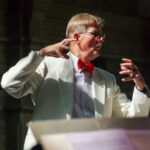 Born in Morley, Yorkshire, and after studies at the Huddersfield School of Music,(now University) and the Royal Manchester College of Music, (now RNCM), Howard worked as a professional clarinettist for almost fifty years, working with Manchester Mozart Orchestra, Gilbert and Sullivan For All, D’Oyly Carte Opera Company and BBC Northern in Manchester; D’Oyly Carte Opera Company, Welsh National Opera, English National Opera, English Music Theatre, Bournemouth Symphony Orchestra while in London; and since its inception in 1978, Opera North for twenty-two years, and later, the Halle orchestra. During all this time, Howard gave many solo and chamber music recitals, broadcasts and recordings, as he managed and performed in his own various ensembles. (Krishna Wind Quintet, Cosmos Wind Quintet, Spohr Trio, The Music Serenade, Palm Court Concert Orchestra, Aeolian Quintet)
Born in Morley, Yorkshire, and after studies at the Huddersfield School of Music,(now University) and the Royal Manchester College of Music, (now RNCM), Howard worked as a professional clarinettist for almost fifty years, working with Manchester Mozart Orchestra, Gilbert and Sullivan For All, D’Oyly Carte Opera Company and BBC Northern in Manchester; D’Oyly Carte Opera Company, Welsh National Opera, English National Opera, English Music Theatre, Bournemouth Symphony Orchestra while in London; and since its inception in 1978, Opera North for twenty-two years, and later, the Halle orchestra. During all this time, Howard gave many solo and chamber music recitals, broadcasts and recordings, as he managed and performed in his own various ensembles. (Krishna Wind Quintet, Cosmos Wind Quintet, Spohr Trio, The Music Serenade, Palm Court Concert Orchestra, Aeolian Quintet)
He was a clarinet tutor at the University of Huddersfield for nine years and twenty-two years teaching and coaching woodwind for North Yorkshire Music Service as well as conducting the Settle Orchestra for fifteen years and then formed his own Promenade Concert Orchestra in Morecambe in 2007, where it has given some 57 concerts to an audience number of over 15,000, as it specialises in light orchestral music.
Ian Vlemmiks studied music at the University of East Anglia under the late Sir Philip Ledger in the late sixties.
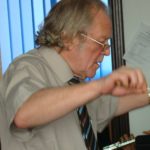 Sang in various choirs including the Aldeburgh Festival singers under the baton of Benjamin Britten and Imogen Holst. On one occasion in the world premiere performance of the “Building of the House” Overture by Britten before the Queen and the Duke of Edinburgh.
Sang in various choirs including the Aldeburgh Festival singers under the baton of Benjamin Britten and Imogen Holst. On one occasion in the world premiere performance of the “Building of the House” Overture by Britten before the Queen and the Duke of Edinburgh.
Have been a teacher for much of my career teaching music and musical history to all age groups from age 7 to 70. Most of my teaching has been in high schools in Suffolk, Manchester, Yorkshire and Salford but also in three private schools in Kuwait and a college in Sri Lanka.
Have written several pieces of music over the years some of which have been performed in public including two musicals for school performance. The first public performance I had was when I was 16 years old, a short piece written for the brass band of which I was a member.
Have played with and conducted many wind ensembles including brass bands and wind bands and have arranged music for many of these at all levels using music from Handel to Mancini as well as composing original pieces for them.
 Ian Wilson is a music graduate of Durham University, where he received composition lessons from John Casken, and is currently a secondary head teacher.
Ian Wilson is a music graduate of Durham University, where he received composition lessons from John Casken, and is currently a secondary head teacher.
He is a prizewinning composer, having won the Commonwealth Music Competition in 2019 for his piece, ‘A Commonwealth Childhood’, which was performed in the 2020 Commonwealth celebrations and is being published by Kingfisher Music and given a commercial recording. He is a member of the Colchester New Music Group and has had regular performances of his works across the Eastern region. The ensembles for which he has written include the British Clarinet Ensemble, the National Flute Choir and the Dunblane Chamber Orchestra, who performed his ‘Three Songs from A Shropshire Lad’ in May 2012 with tenor Gordon Wilson. A song for communion is published on the CCLI website.
He has conducted the Huntingdonshire Philharmonic Society and the St Cecilia Choir in Chelmsford. At St Bonaventure’s School he ran a boys’ choir which won the BBC Choir of the Year regional round in Cambridge, sang at the National Festival of Youth Music regularly, appeared several times on television and won the Jack Petchey Gold Award.
Jachin Pousson was born in the United States [1983], but spent most of his early years in Singapore. As a drummer and lyricist he made numerous international music festival 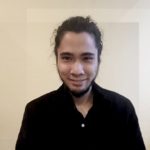 appearances between 2005-2010 before relocating to study composition at the Royal Danish Academy of Music under Hans Abrahamsen in Copenhagen. He then chose to continue studies at Jāzep Vītols Latvian Music Academy under Rolands Kronlaks in Riga, where he earned an MA in Composition in 2015. Today he is an active composer based in Riga. His work – which is often concerned with abstracting forces or phenomena of nature and the human response to these – has consistently enjoyed 3 to 5 premieres every year since 2013 for a wide variety of settings and instrumentations. Besides composing in the academic sphere, Jachin is also an electroacoustic musician, exploring several frontiers of semi-improvised audio/visual performance art. Simultaneously, he continues his research in the field of brainwave entrainment and binaural stimuli as a basis and material for musical design.
appearances between 2005-2010 before relocating to study composition at the Royal Danish Academy of Music under Hans Abrahamsen in Copenhagen. He then chose to continue studies at Jāzep Vītols Latvian Music Academy under Rolands Kronlaks in Riga, where he earned an MA in Composition in 2015. Today he is an active composer based in Riga. His work – which is often concerned with abstracting forces or phenomena of nature and the human response to these – has consistently enjoyed 3 to 5 premieres every year since 2013 for a wide variety of settings and instrumentations. Besides composing in the academic sphere, Jachin is also an electroacoustic musician, exploring several frontiers of semi-improvised audio/visual performance art. Simultaneously, he continues his research in the field of brainwave entrainment and binaural stimuli as a basis and material for musical design.
Jack Fitzgerald began learning the french horn at the age of eight, thanks to a government funded scheme that offered free music lessons to state school students in South East London. He went on to study at Pimlico School’s Centre for 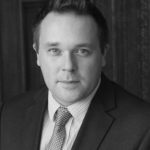 Young Musicians, and from there to perform with a wide variety of ensembles, including the National Youth Wind Orchestra where he was particularly inspired by the music of James Curnow, Arnold Cooke and Malcolm Arnold. This classical base was then broadened thanks to A level lessons with the jazz musician and educator Will Michael.
Young Musicians, and from there to perform with a wide variety of ensembles, including the National Youth Wind Orchestra where he was particularly inspired by the music of James Curnow, Arnold Cooke and Malcolm Arnold. This classical base was then broadened thanks to A level lessons with the jazz musician and educator Will Michael.
For the last eight years Jack has been the Assistant Director of Music at Benenden School and has drawn on all these experiences to create a series of pieces for french horn aimed at developing the aspiring horn player from their earliest steps, to a life long engagement with, and love of the instrument.
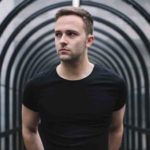 Jake read music at the University of Liverpool, before winning a scholarship to study composition and conducting at the Guildhall School of Music and Drama, graduating with a Merit and the Mary Ryan Award for Composition. Whilst at Guildhall, Jake founded the Sundial Chamber Orchestra, which he conducted in the concert premiere of Julian Philips’ Maxamorphosis. He went on to conduct numerous premiers of student compositions. In his second year, the Richmond Concert Society commissioned his wind quintet Return, which was performed by the Caeli Quintet at St Mary’s Church, Twickenham.
Jake read music at the University of Liverpool, before winning a scholarship to study composition and conducting at the Guildhall School of Music and Drama, graduating with a Merit and the Mary Ryan Award for Composition. Whilst at Guildhall, Jake founded the Sundial Chamber Orchestra, which he conducted in the concert premiere of Julian Philips’ Maxamorphosis. He went on to conduct numerous premiers of student compositions. In his second year, the Richmond Concert Society commissioned his wind quintet Return, which was performed by the Caeli Quintet at St Mary’s Church, Twickenham.
With a background in jazz and musical theatre, Jake has been the composer and music director of numerous productions; he is currently writing the score for a new work called Man and God, in conjunction with University College London. He recently wrote the score for Michael Morpurgo’s Kensuke’s Kingdom, which ran at Pleasance 2, Edinburgh Fringe 2018, and is set to tour England this spring. Shortly after graduating from Liverpool he was the MD for the London premiere of Arthur Miller and Stanley Silverman’s Up From Paradise, and his work with Youth Music Theatre UK saw him compose adaptations of The Crucible and The Time Machine. Jake is a professional writer associate of Mercury Musical Developments, and a featured artist of Talent Unlimited.
James D’Angelo has had a very varied musical career as a composer, pianist (classical and jazz), organist, sound therapist, lecturer and writer. American born, he holds BMus and MMus degrees from the Manhattan 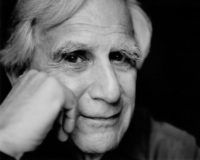
James was born in 1993 in Rotherham and began developing an interest in music from an early age, primarily through the influence of watching his Grandfather’s performances as first clarinet in the Chesterfield Symphony Orchestra. Initially taking lessons on the 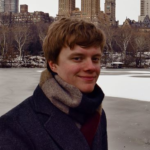 trumpet, followed by the euphonium in secondary school, James taught himself bass guitar, guitar, drums and piano in his teenage years, attaining grade 8 (merit) on the electric bass aged 18. He began composing contemporary pop and rock pieces in secondary school, expanding his repertoire to jazz band by composing a piece for the “Music for Youth” competition in his final year of school education, which reached the national finals in Birmingham, being praised for its harmonic relationships and orchestration.
trumpet, followed by the euphonium in secondary school, James taught himself bass guitar, guitar, drums and piano in his teenage years, attaining grade 8 (merit) on the electric bass aged 18. He began composing contemporary pop and rock pieces in secondary school, expanding his repertoire to jazz band by composing a piece for the “Music for Youth” competition in his final year of school education, which reached the national finals in Birmingham, being praised for its harmonic relationships and orchestration.
James studied Theoretical Physics at the University of Leeds, attaining a first-class master’s degree, and has since taken up composing more seriously alongside graduate work in the IT sector in Leeds. As the bass player in a progressive rock band based in Yorkshire, he contributes to the composition of the band’s original music, which has so far resulted in a 7 track album. James is rapidly expanding his body of works to various smaller classical ensembles, with a view towards orchestrating for ensembles of all sizes. With a keen interest in harmony and orchestration, his compositional style tends to incorporate modal tonalities and diverse harmonic frameworks, which he will continue to use in future works.
Contributing exciting and accessible original pieces to various repertoires, through works that connect emotionally with the listener, are particular driving forces behind James’ composition. He is keen to collaborate with musicians and ensembles of all shapes, sizes and abilities, and would ask anyone who enjoys the work already submitted to get in touch to discuss commissioning a composition.
 James Maddocks (b. 1990) studied composition at the Royal Birmingham Conservatoire where his principal composition tutors were Guy Woolfenden, Richard Causton, Edwin Roxburgh and Philip Martin. Whilst studying he specialised in writing for wind and brass, culminating in performances of his compositions Pagan Dances (cond. Guy Woolfenden, Birmingham Conservatoire Wind Orchestra) and Ozymandias (cond. Alexander Webb, Frontiers Wind Orchestra). During his final year he compiled a guide to wind orchestra orchestration for his major project.
James Maddocks (b. 1990) studied composition at the Royal Birmingham Conservatoire where his principal composition tutors were Guy Woolfenden, Richard Causton, Edwin Roxburgh and Philip Martin. Whilst studying he specialised in writing for wind and brass, culminating in performances of his compositions Pagan Dances (cond. Guy Woolfenden, Birmingham Conservatoire Wind Orchestra) and Ozymandias (cond. Alexander Webb, Frontiers Wind Orchestra). During his final year he compiled a guide to wind orchestra orchestration for his major project.
Since graduating James has received a number of commissions including for the Frontiers Wind Orchestra and choir (This Ancient Earth), the Central England String Ensemble (Moon Dances), RNCM Student Wind Orchestra project (Largo Misterioso) and Beaufort Wind Ensemble (Dreams of Illyria).
As a performer, James has played with a wide variety of orchestras, opera companies and wind orchestras on bassoon and percussion. He currently lives in Greater Manchester with his wife Clare and daughter Sarah.
James Pickering studied Music at the University of Manchester and the Royal Northern College of Music, completing the prestigious and demanding joint course. He also graduated with two Professional Performance Diplomas in Solo 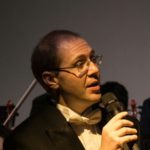 Performance and Chamber Music. As a Tuba player he worked with many of the leading Brass Ensembles and Orchestras in and around the North of England. Following surgery that left him unable to perform at the highest level he switched focus to Music Education and Composition. He is currently the Head of Music at the exclusive Dulwich College Seoul, South Korea.
Performance and Chamber Music. As a Tuba player he worked with many of the leading Brass Ensembles and Orchestras in and around the North of England. Following surgery that left him unable to perform at the highest level he switched focus to Music Education and Composition. He is currently the Head of Music at the exclusive Dulwich College Seoul, South Korea.
As a Composer James’ output has mainly been written for friends, colleagues and students. His influences are broad and varied but include a great debt to Professor John Casken who helped open his eyes to the many possibilities available to a composer in the twenty first century. As a brass player and pianist James has a natural affinity writing for these instruments but has branched out in recent years, writing several solo pieces for strings and a Clarinet Sonata. His output also includes a group of Cello and Tuba duets that take advantage of the many playing techniques both instruments are capable of and the colourful sounds these can create.
Jane studied the flute at the RNCM with Kate Hill and Trevor Wye, graduating in 1985. She liked the North West so much that she stayed on, moving to Preston, with her husband and two children, in Guild Year, 1992.
She currently teaches at Keele and Manchester Metropolitan Universities and Clitheroe Royal Grammar School. Jane has given lunchtime concerts around the North West, and is a regular member of Preston Flute Group.
Jason McMahon is a clarinetist, pianist, composer and actor/director based in the North West of England. He studied Music and Drama at the University of Manchester including Clarinet with Jill Allen and composition with Dr Camden Reeves. Born [1993] 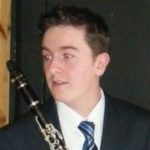 and raised in Preston, Jason is proud of his Lancashire heritage and is delighted to be working in the area, and with people he has known for many years. A contemporary music enthusiast, Jason is keen to celebrate new music by performing new works by relatively unknown as well as established composers, such as Michael Finnisy. Furthermore, Jason celebrates new music by writing contemporary music of his own, which has been described by some as “groundbreaking” as well as innovative, dramatic and fun. Jason is also interested in music education and wishes to enjoy a career in music and drama in schools across the county, showing children the importance of the arts in the foreground of British society and identity and not sidelined as some would wish for them to be. Much of Jason’s work both as a composer and performer centres around working with fellow composers on commissions, and with actors, directors and dancers to try and bring the art forms [music and drama] closer together, particularly in performance. The majority of Jason’s research is focused around the impact of musical performance, the power and suggestion of music through performance; and most importantly the drama in the music, the ‘dramma per musica’. It is this research which is fundamental in the foundations of Jason’s compositions and theatre pieces
and raised in Preston, Jason is proud of his Lancashire heritage and is delighted to be working in the area, and with people he has known for many years. A contemporary music enthusiast, Jason is keen to celebrate new music by performing new works by relatively unknown as well as established composers, such as Michael Finnisy. Furthermore, Jason celebrates new music by writing contemporary music of his own, which has been described by some as “groundbreaking” as well as innovative, dramatic and fun. Jason is also interested in music education and wishes to enjoy a career in music and drama in schools across the county, showing children the importance of the arts in the foreground of British society and identity and not sidelined as some would wish for them to be. Much of Jason’s work both as a composer and performer centres around working with fellow composers on commissions, and with actors, directors and dancers to try and bring the art forms [music and drama] closer together, particularly in performance. The majority of Jason’s research is focused around the impact of musical performance, the power and suggestion of music through performance; and most importantly the drama in the music, the ‘dramma per musica’. It is this research which is fundamental in the foundations of Jason’s compositions and theatre pieces
Jo Griffiths has moved into Composition after a career in teaching spanning 24 years. She has been M.D. for many musical productions and is currently the keyboard player in a function band playing regularly for private events.
Jo returned to education as a mature student in 2008 completing an MA in composition at Salford University in 2013 with Dr. Alan Williams.
Her work so far has been primarily in the community, writing a suite based on Jack and the Beanstalk for school children performed in 2010. In 2011 she collaborated with The Abney Orchestra to produce a piece for their concert programme called Silhouette, and worked 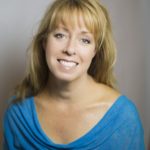 with contemporary dancers on a descriptive piece called The Locked Door.
with contemporary dancers on a descriptive piece called The Locked Door.
More recently The National Flute Orchestra have performed Jongleur, a piece written specifically for flute orchestra, and now include it regularly in their concert programme.
In 2014, Jo looks forward to working with The London Contemporary Chamber Orchestra and The London Wind Consort, both under the direction of Alan Taylor, to create music for their concert programme. She also continues to form collaborations to produce new music for schools. A junior solo piano book is also in production.
Many of Jo’s pieces are aimed at young students and adults returning to instruments or learning late in life who wish to enjoy performing but have not or may not reach virtuoso standard.
John originates from North East Lincolnshire. His Musical training began on Euphonium, and he played in his local Brass Band at championship level up until the age of 18. At 18 he developed an interest in other styles of 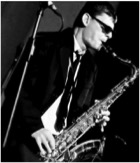
John is currently a civil servant, but plays with his local 12 piece Soul Band the Rumble Band who celebrate their 30th Anniversary this year. Music and composition remain his main pursuit and passion
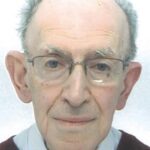 John Dutton was born in Denbighshire, and became interested in writing music when he was about sixteen. He had passed examinations for piano playing when he was much younger, but taught himself composition, writing light music for piano, such as rags, marches etc. in his spare time.
John Dutton was born in Denbighshire, and became interested in writing music when he was about sixteen. He had passed examinations for piano playing when he was much younger, but taught himself composition, writing light music for piano, such as rags, marches etc. in his spare time.
Many years later, in 1989, John decided to teach himself brass band arranging, although he does not play a brass instrument. He has since written several marches, and arranged others by R.B. Hall, Abe Holzmann, Alex. F. Lithgow and Frank H. Losey.
John has written various pieces including duets and quartets, and arranged other music for brass band.
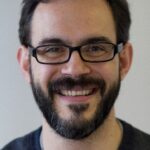 John has been composing and arranging since his teens and loves working on pieces to be enjoyed by community musicians; his work ‘Green Sky’ won the Making Music category of the British Composer Awards in 2008, written for the London Contemporary Chamber Orchestra. He conducts Lambeth Wind Orchestra and the London Consorts of Winds Clarinet Choir and can also be found in various ensembles playing large clarinets, saxophones, low brass and percussion as well as working full-time in finance for the Royal Academy of Dramatic Art in London.
John has been composing and arranging since his teens and loves working on pieces to be enjoyed by community musicians; his work ‘Green Sky’ won the Making Music category of the British Composer Awards in 2008, written for the London Contemporary Chamber Orchestra. He conducts Lambeth Wind Orchestra and the London Consorts of Winds Clarinet Choir and can also be found in various ensembles playing large clarinets, saxophones, low brass and percussion as well as working full-time in finance for the Royal Academy of Dramatic Art in London.
John Hulaton got his start in music in Pearl City, Hawaii when he was 11 years old and his music teacher “mistakenly” gave him a trumpet. After four years of incessant noisemaking, he started playing gigs in bands and shows in Hawaii. Somewhere along the way, he 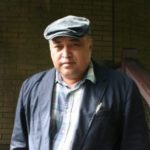 picked up the guitar, ukulele, and drums, and also did a bit of singing. John studied composition and music theory privately with Joseph Carvalho, formerly of the Royal Hawaiian Band, and Lou Paino, a former Hollywood studio musician. John currently lives in Osaka, Japan where he quietly writes music for commercials, games, promotional videos, and the odd artist in genres from classical to techno to enka.
picked up the guitar, ukulele, and drums, and also did a bit of singing. John studied composition and music theory privately with Joseph Carvalho, formerly of the Royal Hawaiian Band, and Lou Paino, a former Hollywood studio musician. John currently lives in Osaka, Japan where he quietly writes music for commercials, games, promotional videos, and the odd artist in genres from classical to techno to enka.
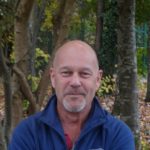
Jonathan had a fulfilled teaching career delivering music in secondary schools and as head of department, now semi-retired; he works as examiner and moderator for OCR, devoting more time to composition and private tuition.
Composing mainly for woodwind instruments, the Flute in particular; he has composed pieces for Flute and Woodwind ensembles across the ability range and in a variety of styles, his more advanced compositions do represent a test of technique and musicality. Luckily he is married to a very accomplished Flautist who tackles new challenges with enthusiasm and energy.
Jonty Tunes for Flute and Piano (Easy to Intermediate) received an Honourable Mention in this year’s American National Flute Association awards.
You’ll find his pieces engaging, precise and full of character.
Composer & pianist Juan María Solare (Buenos Aires, 1966), an Argentine living in Germany, is one of those musicians that open scarcely travelled paths. The singularity of his music stems from the confluence between post-Piazzollian tango and classical 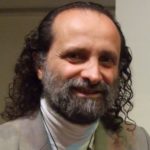 contemporary music. His peculiar style represents a synthesis of North and South, classical and popular, wit and melancholy, performance and composition. “Art music and light music are not irreconcilable extremes, but poles in a force field”, says Solare about his “musical bilingualism”.Composition degrees at the IUNA (Instituto Universitario Nacional del Arte), Buenos Aires and at the Hochschule für Musik Köln (with Johannes Fritsch, Clarence Barlow, Hans Ulrich Humpert, Mauricio Kagel). Studies in Stuttgart with Helmut Lachenmann. Regular assistant to the composition courses of Karlheinz Stockhausen in Kürten, Germany. “A full-blooded musician.” (Hans-Joachim Brandt, Wümme Zeitung, Lilienthal) “He is integer, tolerant, very friendly: a very rare spirit.” (Karlheinz Stockhausen).His music has been included in several short films (experimental, documentary, suspense). Composition prizes in Argentina, Germany, United Kingdom, Austria, Croatia and Spain. Fifteen CDs by different performers include at least one piece by Juan María Solare. Soloists and ensembles from Japan to New York, from Australia to Greece, have played his music.He has given piano recitals in Buenos Aires and dozens of Argentinean cities, plus Berlin, Istanbul, Finland, Denmark, Amsterdam, Madrid, Graz, Geneva, Seville, London… The audiences at his concerts are fascinated by his warmth and quality. As a pianist with over 400 concerts on his account, he has participated at the World Tango Summit on three occasions.Solare conducts the Orquesta no Típica at the university of Bremen (Germany). At the Hochschule für Künste in Bremen he teaches Composition and Arrangements. He also conducts the Jacobs Chamber Orchestra at the Jacobs University Bremen and the symphony orchestra of the Bremer Orchestergemeinschaft. He is the editor of four tango albums for the publishing house Ricordi Munich. www.JuanMariaSolare.com
contemporary music. His peculiar style represents a synthesis of North and South, classical and popular, wit and melancholy, performance and composition. “Art music and light music are not irreconcilable extremes, but poles in a force field”, says Solare about his “musical bilingualism”.Composition degrees at the IUNA (Instituto Universitario Nacional del Arte), Buenos Aires and at the Hochschule für Musik Köln (with Johannes Fritsch, Clarence Barlow, Hans Ulrich Humpert, Mauricio Kagel). Studies in Stuttgart with Helmut Lachenmann. Regular assistant to the composition courses of Karlheinz Stockhausen in Kürten, Germany. “A full-blooded musician.” (Hans-Joachim Brandt, Wümme Zeitung, Lilienthal) “He is integer, tolerant, very friendly: a very rare spirit.” (Karlheinz Stockhausen).His music has been included in several short films (experimental, documentary, suspense). Composition prizes in Argentina, Germany, United Kingdom, Austria, Croatia and Spain. Fifteen CDs by different performers include at least one piece by Juan María Solare. Soloists and ensembles from Japan to New York, from Australia to Greece, have played his music.He has given piano recitals in Buenos Aires and dozens of Argentinean cities, plus Berlin, Istanbul, Finland, Denmark, Amsterdam, Madrid, Graz, Geneva, Seville, London… The audiences at his concerts are fascinated by his warmth and quality. As a pianist with over 400 concerts on his account, he has participated at the World Tango Summit on three occasions.Solare conducts the Orquesta no Típica at the university of Bremen (Germany). At the Hochschule für Künste in Bremen he teaches Composition and Arrangements. He also conducts the Jacobs Chamber Orchestra at the Jacobs University Bremen and the symphony orchestra of the Bremer Orchestergemeinschaft. He is the editor of four tango albums for the publishing house Ricordi Munich. www.JuanMariaSolare.com
Karen Gourlay’s music, inspired by a wide range of sources, often incorporates references to jazz and other popular idioms. She studied jazz and popular music at Leeds College of Music, specialising in flute and guitar. Later she studied composition with Philip Wilby at the University of Leeds, and was awarded a 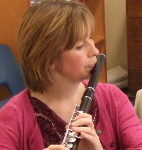
In recent years she has taken commissions and entered competitions, and her music has been played throughout the world. In 2011 one of her pieces was premiered at the NFA Convention.
Kedarnath Awati (born 1957, Pune, India) started learning the piano from the age of eight. From the age of sixteen he fancied that he would become a professional mathematician…he received his masters degree in Pure Maths from the University of Pune in 1979 and 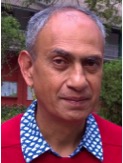
From 1991 to 1997 he worked almost exclusively as a film composer for students who had a bent towards the experimental in matters of music and sound design. In between, he wrote a symphonic Allegro that had to wait almost twenty years to get a good recording. It can be located and heard on YouTube for those who are interested. He was also able to take time off between 2003 and 2007 to pursue and complete a doctorate in Music Theory and Composition under Dr. David Felder at the State University of New York at Buffalo. Today he divides his work time between his duties at the Film Institute and giving private instruction (via mobile and Skype!) to Indian students on the various intricacies of the European harmonic style of the 18th and 19th centuries. After all this, if and when he has time he composes music!
He lives in Pune with his wife Simrita and son Siddharth, and spends his spare time reading (Ian Rankin, Haruki Murakami and Jo Nesbo are his current favorites), hiking and playing Scrabble.
Keiron Anderson studied at the RNCM with Philip Jones OBE, studying a wide range of techniques for developing ensemble playing in small and large groups. Since then he has played in many professional orchestras, led his own 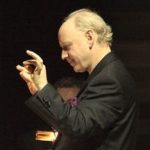 group in theatres, cruise ships and cabarets, taught and conducted a range of instrumental groups, and composed and arranged a wide variety of music.
group in theatres, cruise ships and cabarets, taught and conducted a range of instrumental groups, and composed and arranged a wide variety of music.
Keiron continues to write music for brass, wind and string ensembles as well as works for brass band and musical theatre. He maintains a busy schedule of conducting and directing groups from saxophone ensembles to symphonic wind orchestras.
The Yorkshire Wind Orchestra, Harlequin Brass, The Phoenix Concert Band, Nottingham Symphonic Winds, Leeds College of Music Wind Ensemble, the National Saxophone Choir and the National Youth Wind Orchestra of Scotland are amongst the groups who have benefitted from his innovative approach to ensemble playing. Keiron has been composing works for these groups for many years and has written four musicals for the students at Ilkley Grammar School, where he was until 2014 Head of Creative Arts.
Keiron is now concentrating fully on his composing and conducting as well as coaching a number of advanced performers and conductors. More details on his website www.keironanderson.co.uk
Kevin began his musical life as most musicians do by playing the recorder. This led onto the trumpet and then the trombone .At the age of 15 he joined the Army as a trombone player quickly rising through the playing ranks of the Junior Army Service and then onto Kneller 
At this time he was also lucky enough to further my trombone skills, through lessons from the Principal of the BSO, Mr. Dennis Wise.
He left the Army in 1981 and could frequently be found depp-ing in various theatre pits throughout the south coast. The list of ensemble membership runs between big bands, jazz bands, brass ensembles, orchestras, German bands and recorder consorts!
At the present time he is teaching at Thorngrove School in Berkshire and for the Berkshire Maestros in Newbury where he works with Clifton Wind Band . He is also the musical director of The Allegro Wind Band and Andover Light Orchestra . He regularly writes and arranges for all these ensembles.
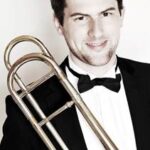 Kieran is currently working as a composer and educator based in Abu Dhabi, UAE. His performance experiences range from playing with major symphony orchestras to performing solo recitals. He has studied both classical and jazz music at the Royal Northern College of Music in Manchester and at the Cleveland Institute of Music in the USA, being taught by some of the most successful trombonists in the industry. When working as a freelance musician in the UK, Kieran worked with some of the country’s leading orchestras including the Royal Liverpool Philharmonic Orchestra and The Hallé Orchestra. He has also given numerous solo recitals both in the UK and the USA including a formal evening recital in the newly built Mixon Hall, Cleveland, Ohio. During his studies, Kieran was awarded the Terence Nagle award for solo playing for his performance of ‘Sequenza V’ by Berio. Also, as part of the Five Cities brass quintet, he was awarded the Philip Jones prize for chamber music.
Kieran is currently working as a composer and educator based in Abu Dhabi, UAE. His performance experiences range from playing with major symphony orchestras to performing solo recitals. He has studied both classical and jazz music at the Royal Northern College of Music in Manchester and at the Cleveland Institute of Music in the USA, being taught by some of the most successful trombonists in the industry. When working as a freelance musician in the UK, Kieran worked with some of the country’s leading orchestras including the Royal Liverpool Philharmonic Orchestra and The Hallé Orchestra. He has also given numerous solo recitals both in the UK and the USA including a formal evening recital in the newly built Mixon Hall, Cleveland, Ohio. During his studies, Kieran was awarded the Terence Nagle award for solo playing for his performance of ‘Sequenza V’ by Berio. Also, as part of the Five Cities brass quintet, he was awarded the Philip Jones prize for chamber music.
Kyle Hovatter’s (b.1986) works span orchestral, choral, chamber, and electronic genres Often working closely with local San Francisco ensembles, his music has also been championed by players in Italy, Germany, France, Hungary, Romania, Australia, and throughout the United States.  Recent collaborators include Sarah Cahill, sfSound, Jeff Anderle, Susan Nelson, Miguel Bonachea Diaz, Nonsemble, Amy Foote, Jarring Sounds, the International Low Brass Trio, the Silver Keys Trio, and Nicole Paiement. He is an active musician in San Francisco, a member of the International Orange Chorale, and a student of Dan Becker’s. Mr. Hovatter has a private piano studio and works as the organist and Director of Music at Zion Lutheran Church in San Francisco.
Recent collaborators include Sarah Cahill, sfSound, Jeff Anderle, Susan Nelson, Miguel Bonachea Diaz, Nonsemble, Amy Foote, Jarring Sounds, the International Low Brass Trio, the Silver Keys Trio, and Nicole Paiement. He is an active musician in San Francisco, a member of the International Orange Chorale, and a student of Dan Becker’s. Mr. Hovatter has a private piano studio and works as the organist and Director of Music at Zion Lutheran Church in San Francisco.
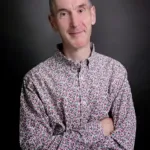 Lance grew up on a small dairy farm on the Isle of Wight, where he played the horn in the County Youth Orchestra and was organist at Godshill Parish Church from the age of 13. A Junior Exhibition award enabled him to study piano with Joan Last for his last two years at High School. He went on to study music and then organology at the University of Edinburgh, where his tutors included Kenneth Leighton and Grant O’Brien, culminating in his PhD on Hamburg-made clavichords; he later took various history and Renaissance art courses at the Open University.
Lance grew up on a small dairy farm on the Isle of Wight, where he played the horn in the County Youth Orchestra and was organist at Godshill Parish Church from the age of 13. A Junior Exhibition award enabled him to study piano with Joan Last for his last two years at High School. He went on to study music and then organology at the University of Edinburgh, where his tutors included Kenneth Leighton and Grant O’Brien, culminating in his PhD on Hamburg-made clavichords; he later took various history and Renaissance art courses at the Open University.
He has had a portfolio career, including schoolteacher, museum curator and crime scene investigator. He currently teaches various undergraduate courses in the music department at the University of Edinburgh, edits The Galpin Society Journal, and plays the organ at Polwarth Parish Church. Lance is particularly interested in eighteenth-century keyboard instruments and has published articles in Early Music, Eighteenth-Century Music, The Galpin Society Journal, and the RMA Research Chronicle, some in collaboration with Jenny Nex, and contributed multiple entries to The Grove Dictionary of Musical Instruments (2014) and the Cambridge Encyclopedia of Brass Instruments (2018). He is also a keen allotment gardener and enjoys beachcombing for fossilised sharks’ teeth in West Sussex.
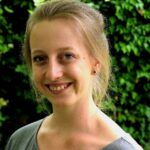 Laura Shipsey is a composer based in Hertfordshire, UK. Her music is characterised by a playful approach to the balance of continuity and discontinuity which sees contrasting figures spun together into multidimensional musical worlds. Recent works include orchestral pieces Samara for Aldworth Philharmonic) and Hatch (for Cambridge, Heidelberg, Montpellier Youth Orchestra), her clarinet trio Beacons, several semi-improvised graphic scores for flexible ensemble developed with her ensemble the Hooting Cow Collective, and Beam for two wood blocks. Laura is currently working on a new piece for Brass Band as part of Making Music’s Adopt a Composer scheme for the City of Bristol Brass Band, and completing her first work for sinfonietta which was due to be premiered by the Britten Pears Sinfonietta and Jessica Cottis at Aldeburgh festival. Having first studied composition with Sam Hayden and Eric Egan at Durham University, in 2020 Laura will begin a PhD under the supervision of Arlene Sierra supported by a full studentship at Cardiff University.
Laura Shipsey is a composer based in Hertfordshire, UK. Her music is characterised by a playful approach to the balance of continuity and discontinuity which sees contrasting figures spun together into multidimensional musical worlds. Recent works include orchestral pieces Samara for Aldworth Philharmonic) and Hatch (for Cambridge, Heidelberg, Montpellier Youth Orchestra), her clarinet trio Beacons, several semi-improvised graphic scores for flexible ensemble developed with her ensemble the Hooting Cow Collective, and Beam for two wood blocks. Laura is currently working on a new piece for Brass Band as part of Making Music’s Adopt a Composer scheme for the City of Bristol Brass Band, and completing her first work for sinfonietta which was due to be premiered by the Britten Pears Sinfonietta and Jessica Cottis at Aldeburgh festival. Having first studied composition with Sam Hayden and Eric Egan at Durham University, in 2020 Laura will begin a PhD under the supervision of Arlene Sierra supported by a full studentship at Cardiff University.
Lenny Cavallaro is an American composer noted for his adherence to 18th and 19th century forms and harmonic idioms. His Sonata in D minor for Violin and Klavier was performed in the Lincoln Centre in 1989. His more recent ventures have included a reconstruction of 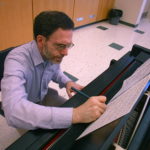 a Haydn concertino, which he performed with Salem Philharmonic in 2009, and a setting of ‘Heartbreak Hill’ by Celia Thaxter, to commemorate the 375th anniversary of the founding of Ipswich, Massachusetts.
a Haydn concertino, which he performed with Salem Philharmonic in 2009, and a setting of ‘Heartbreak Hill’ by Celia Thaxter, to commemorate the 375th anniversary of the founding of Ipswich, Massachusetts.
Also an accomplished pianist, Lenny was a top prize-winner in the JS Bach International Competition for Pianists, and subsequently played that composer’s Six Partitas to the highest critical acclaim in the Carnegie Recital Hall. Additionally a man of letters, he has served for nine years as music critic for the New Haven Register. He teaches at Northern Essex Community College, and has a number of books to his credit.
Leonello Capodaglio was born October 6, 1945 and resides in Lendinara, in the Venetian region of Italy. He studied in Venice with Gino Gorini (piano), Gian Francesco Malipiero and Ugo Amendola 
Having developed his activities as a pianist, composer, harpsichord soloist and conductor, he was Director of the National Conservatory of Music of Adria and director of various chamber ensembles and symphony orchestras. He has composed numerous times winners of national and international competition of composition, and is currently president or commissioner in numerous competitions, including the prestigious “V. Bucchi” in Rome.
He has the author of 356 opus numbers composed in tonal style, 249 of which were published by 42 editions in Italy, France, Belgique, Germany, Suisse, United kingdom, Usa and Canada. In addition, he has had more than 300 performances of his music in Italy and in the world, with performances and television broadcasting, and varied discography.
The most well known compositions are the lyric operas “Fornarina”, “Calliroe”, “Fanny”, three Oratorios, a Marian Cantata, Six Suites for orchestra and “La Beltà” (The Beauty), a series of six concerts for soloist and orchestra. Non-marginal musicologist, his activities with the wise man and conferences and with the discovery of fonocromatica technique used by Antonio Vivaldi. He has published ten volumes of poetry and prose. His biography is found in many dictionaries in Italian, German, and English languages.
Liz Sharma has been writing music since childhood. She has composed for orchestras, choirs, wind bands and chamber ensembles, and her music is played all over the world, particularly music for wind ensembles.
 She is an experienced teacher, Head of Music in Comprehensive schools, a Special School, in centres for disabled adults, and now in Primary schools. Having lived and worked in very ethnically diverse communities, She is interested in World Music, and has written 9 books, including ‘Music Worldwide’ for Cambridge University Press. She enjoys playing oboe, cor anglais, saxophones and recorders, and enjoys meeting people who are enthusiastic about music.
She is an experienced teacher, Head of Music in Comprehensive schools, a Special School, in centres for disabled adults, and now in Primary schools. Having lived and worked in very ethnically diverse communities, She is interested in World Music, and has written 9 books, including ‘Music Worldwide’ for Cambridge University Press. She enjoys playing oboe, cor anglais, saxophones and recorders, and enjoys meeting people who are enthusiastic about music.
Composer, pianist and conductor, Lodi Luka was born in Shkoder (Albania) in 1980 in a musicians family. He performed for various institutions, associations and concert seasons (Opera House of Tirana, Shkoder’s Migjeni Theatre, House of Music and Theatre Rendano  of Cosenza, Theatre of the University of Calabria, University of Fine Arts in Graz (Austria), Puccini Hall of the Conservatory of Milan, Week of Albanian Culture at Villa Litta Lainate, Sebino Summer Festival, Festival of Montalto Uffugo Leoncavallo, Rendese Festival September, the Italian Embassy in Albania etc.).
of Cosenza, Theatre of the University of Calabria, University of Fine Arts in Graz (Austria), Puccini Hall of the Conservatory of Milan, Week of Albanian Culture at Villa Litta Lainate, Sebino Summer Festival, Festival of Montalto Uffugo Leoncavallo, Rendese Festival September, the Italian Embassy in Albania etc.).
As a composer prefers a communicative language that is influenced by the traditional music and contemporary music, without forgetting its Balkan roots.
He is the author of two chamber operas: Io e l’altro (Me and the other), loosely based on a short story by Borges and Il Sogno (The Dream) of a libretto by Enrico De Luca.
He collaborates as conductor with the chamber orchestra “I musici di Parma” with the Italian Harps Orchestra and the contemporary music ensemble “L’ Altro Ensemble” which he founded.
He started studying the piano at the music school in his hometown when he was six, and received his Diploma in 1998 from the College of Music “Prenke Jakove” in Shkoder. Since then he has been living in Italy, receiving a Piano Diploma from the Milan Conservatory, a Diploma in Composition, a master degree in Music Education and a master degree in Piano Teaching from the Conservatory in Cosenza. Among the many teachers who have guided his musical studies: the pianist Aldo Ciccolini, composers Vincenzo Palermo, Elisabetta Brusa and Luis Bakalov and conductors Pietro Mianiti e Ovidiu Balan.
Lynda Robertson lives and works in West Yorkshire, but grew up in Hampshire, where she took up the flute aged 13.
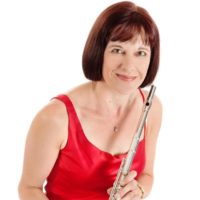 She graduated from Huddersfield University in 2002 with B.Mus in Music, majoring in flute performance, and also has an LRSM diploma in Flute Performing (ABRSM).
She graduated from Huddersfield University in 2002 with B.Mus in Music, majoring in flute performance, and also has an LRSM diploma in Flute Performing (ABRSM).
She teaches flute, clarinet, saxophone and music theory privately, and has also worked as a peripatetic woodwind teacher in schools. She performs regularly in the West Yorkshire area: both in local orchestras and occasionally as a soloist.
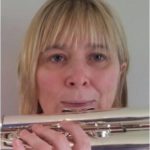 Lynne Williams studied music at Durham University, and is now a freelance woodwind player, repairer and publisher in the North West of England. She is a member of the National Flute Orchestra, Preston Flute Group, Casual Sax Quartet and regularly perfoms with local orchestras and ensembles on a wide variety of different wind instruments.
Lynne Williams studied music at Durham University, and is now a freelance woodwind player, repairer and publisher in the North West of England. She is a member of the National Flute Orchestra, Preston Flute Group, Casual Sax Quartet and regularly perfoms with local orchestras and ensembles on a wide variety of different wind instruments.
She is a keen composer and has been writing music for her own pupils for a number of years. Writing for all wind instruments, her works include study books, solo pieces and small ensembles, many of which are excellent teaching materials.
Malcolm’s career began in 1972 as a professional trumpet player and teacher. Later on he joined the Senior Management Team of the Milton Keynes Music Service and in 2000 became Deputy Head. 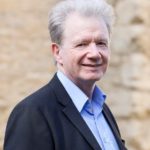 Malcolm’s love of choral conducting began early in his career and he has conducted many of the popular works from the classical choral repertoire. In 1984 he began working with Milton Keynes’ many musical theatre groups and has been the MD for nearly 40 fully staged productions. Throughout the course of his career as a teacher, Malcolm has necessarily been required to adapt, arrange and compose music for many varied vocal and instrumental ensembles. In 2009 he decided to take early retirement from the MK Music Service in order to pursue that aspect of musical creation more fully. He now lives in Norfolk but keeps in touch with Milton Keynes by being the MD of Heart and Music, one of the town’s premier choral groups.
Malcolm’s love of choral conducting began early in his career and he has conducted many of the popular works from the classical choral repertoire. In 1984 he began working with Milton Keynes’ many musical theatre groups and has been the MD for nearly 40 fully staged productions. Throughout the course of his career as a teacher, Malcolm has necessarily been required to adapt, arrange and compose music for many varied vocal and instrumental ensembles. In 2009 he decided to take early retirement from the MK Music Service in order to pursue that aspect of musical creation more fully. He now lives in Norfolk but keeps in touch with Milton Keynes by being the MD of Heart and Music, one of the town’s premier choral groups.
Marc is a member of SCI and ASCAP. His works have been performed in many piano recitals, and music theory-composition forums in Miami, Spain and Italy. His compositions include works for instrumental, vocal, and electronic music. List of works: Suite for clarinet & bassoon An Afternoon In The Park (vibes, bass & perc.) Midday Voices (Jazz vocal ensemble) Café (piano) Nocturne (piano) Prelude & Toccata (piano) Impromptu (piano) Recuerdos de España (piano) Fantasia (flute & piano) The Beauty Of Nature (mezzo-soprano & piano) We Were Young (a cappella chorus) Prisoner Of The Sea (Symphonic poem) Sancta Maria Magdalena (for solo soprano, chorus and orchestra) Images of a dream (Symphonic poem) Spring Harvest (flute & string orchestra) Electronic Music: Forbidden City, Rainy Afternoon, Sounds & Images, Voices Of Nature.
Marina van E Kummer is the founding conductor/manager of The Peninsula Clarinet Choir and conducts several other ensembles including The Torbay and South Devon Clarinet Choir.
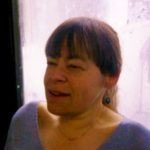
Having studied with David Rix and Roger Fallows she is now in her third decade of teaching in Devon and does most of her arranging whilst managing the Music Library at Dartington Hall on behalf of Dartington International Summer School where she has the pleasure of working with such clarinet luminaries as David Campbell, Victoria Soames Samek and the late, much lamented, Alan Hacker.
She owes enormous thanks to Michael Watkins of Reynard Music who encouraged her in the early days and publishes her arrangements for standard clarinet choir. Having the full range of clarinets (we have three contra-altos and a contra bass!) is a luxury denied to others and she is grateful to Forton Music for showing interest in her work for multiple Bb’s.
British born composer Mark Whitefield spent most of his formative years in the Midlands area of the UK before relocating to the West Country to undertake a period of study at Dartington College of Arts, where he obtained a BA [Hons] in music composition.
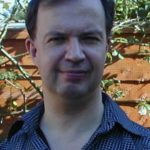 He is a composer of eclectic and wide ranging interests with a compositional process that has been described as classical/art music, but within a tonal context, that can at times encompass elements from jazz and world music.
He is a composer of eclectic and wide ranging interests with a compositional process that has been described as classical/art music, but within a tonal context, that can at times encompass elements from jazz and world music.
His activities as a composer have included compositions for the concert hall, film and devised theatre projects where he has composed for an orchestra, chamber ensembles and pieces for solo instruments. He has also developed, in recent years, an interest electro-acoustic music which has resulted in several compositions in this medium.
He is also a member of the British Academy of Songwriters, Composers and Authors.
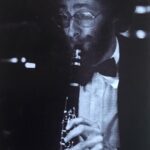 Born in 1951 Martin attended St. Joseph’s College in Blackpool, achieving seven GCE’s and two O-levels. He was accepted as a clarinettist in the National Youth Orchestra of Great Britain from 1969-1973. He also studied clarinet with Sidney Fell at the Royal Manchester College of Music (which became the Royal Northern College of Music). He achieved both diplomas as both a teacher and a performer there. Following his graduation, he worked as a freelance clarinettist in the north of England and Scotland. In 1978 he was appointed principal clarinettist in the London Festival Ballet, a post he was to hold until 1985 when he decided to return to the north of England. He then dedicated himself to teaching, but still found time to play chamber music, playing the Weber, Mozart and Brahms clarinet quintets with the Edinburgh String Quartet. On his retirement in 2007 he moved out to Toronto, where his focus shifted to composing, whilst performing occasional chamber music with friends. He returned to England in 2012, where he died in 2019.
Born in 1951 Martin attended St. Joseph’s College in Blackpool, achieving seven GCE’s and two O-levels. He was accepted as a clarinettist in the National Youth Orchestra of Great Britain from 1969-1973. He also studied clarinet with Sidney Fell at the Royal Manchester College of Music (which became the Royal Northern College of Music). He achieved both diplomas as both a teacher and a performer there. Following his graduation, he worked as a freelance clarinettist in the north of England and Scotland. In 1978 he was appointed principal clarinettist in the London Festival Ballet, a post he was to hold until 1985 when he decided to return to the north of England. He then dedicated himself to teaching, but still found time to play chamber music, playing the Weber, Mozart and Brahms clarinet quintets with the Edinburgh String Quartet. On his retirement in 2007 he moved out to Toronto, where his focus shifted to composing, whilst performing occasional chamber music with friends. He returned to England in 2012, where he died in 2019.
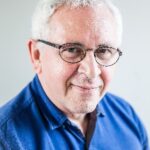 I am a pianist, bass player and cellist living in Berkshire, England. Retired from a non-musical career, I always used to say I worked there in my spare time, much of the rest being music. I compose mainly works for duos, string quartets and small ensembles for people I know to play, including the odd choral work, eleven string quartets and two flute sonatas. Also a few larger works: concertos for flute and for harp and one symphony.
I am a pianist, bass player and cellist living in Berkshire, England. Retired from a non-musical career, I always used to say I worked there in my spare time, much of the rest being music. I compose mainly works for duos, string quartets and small ensembles for people I know to play, including the odd choral work, eleven string quartets and two flute sonatas. Also a few larger works: concertos for flute and for harp and one symphony.
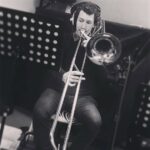 Matt is a freelance trombonist, brass and theory teacher, music arranger and copyist based in London. He graduated from the Royal College of Music, London, in 2017 with a 1st class degree in Music.
Matt is a freelance trombonist, brass and theory teacher, music arranger and copyist based in London. He graduated from the Royal College of Music, London, in 2017 with a 1st class degree in Music.
He has a lot of experience in a wide variety of genres, including playing in orchestras, musicals, big bands and function bands, as well as appearing in films and TV as a miming musician, including Rocketman (2019), Christopher Robin (2018) and Call The Midwife (2019).
In addition to playing and teaching, Matt is also an avid arranger, orchestrator and copyist. He has orchestrated various musical theatre songs for professional orchestras, as well as providing music engraving services for many composers and orchestrators.
Aside from music, Matt enjoys running, swimming and cycling.
Matteo Firmi was born in Trieste (Italy), on 21th of February 1984. He started taking trumpet lessons at the Filarmonica di Santa Barbara in Muggia at the age of 6. The following years he continued his trumpet study at the Tartini conservatory in Trieste with the 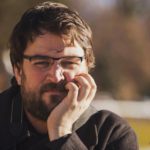 teachers Cal, Bellucco, Cudiz, Ferrari and Morosini. Furthermore he studied direction for wind orchestra at ISEB (European High School for Band Study) with the teachers Jan Cober for conducting, Felix Hauswirth for repertoire and Carlo Pirola for band instrumentation. He also did courses in choral and choir direction with maestro Adriano Martinolli D’Arcy at the Conservatory of Trieste as well as he took composition classes with Franco Cesarini at ISEB, and in the composition laboratory ‘Alla Leopolda’ in Florence. Later on in life Matteo attended master classes at the Conservatory of Udine with Jan van der Roost and Johan de Meij.
teachers Cal, Bellucco, Cudiz, Ferrari and Morosini. Furthermore he studied direction for wind orchestra at ISEB (European High School for Band Study) with the teachers Jan Cober for conducting, Felix Hauswirth for repertoire and Carlo Pirola for band instrumentation. He also did courses in choral and choir direction with maestro Adriano Martinolli D’Arcy at the Conservatory of Trieste as well as he took composition classes with Franco Cesarini at ISEB, and in the composition laboratory ‘Alla Leopolda’ in Florence. Later on in life Matteo attended master classes at the Conservatory of Udine with Jan van der Roost and Johan de Meij.
At the moment Matteo is the conductor of Banda dei Donatori del Sangue di Villesse ( Band of Blood Donors), the choir Duomo di Muggia and he works as a critic for musicals for the webzine www.amicidelmusical.it.
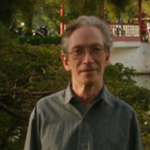 Michael James Regan (b. 1947) studied at the Guildhall School of Music & Drama. His teachers there were Peter Wishart, Buxton Orr, Dennis Dance and Patric Standford. He later taught theory and composition at the London College of Music until 1997.
Michael James Regan (b. 1947) studied at the Guildhall School of Music & Drama. His teachers there were Peter Wishart, Buxton Orr, Dennis Dance and Patric Standford. He later taught theory and composition at the London College of Music until 1997.
Michael has a master’s degree in Composition awarded by the University of West London, and since 2009 has been a member of London Composers Forum. He says of his work:
“As a composer, I have never felt the need to adhere to one style in my work and influences range from several seemingly incompatible sources: classical European, jazz, minimalism and oriental music have all been inspirations. Composers and writers that have influenced my work [or in whom I take a particular interest] include Kitaro, Tom Johnson, Frank Denyer, Laurence Crane, Satie [via Roger Eno], John Cage, Dick Raaijmakers, Hardy, Eliot and Yeats.”
From early in his childhood Michael Walshe was very much aware of music. His mother who before her marriage had been a professional singer continued with her singing during his formative years so he was exposed from an early age to a variety of musical 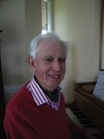
He took up the Clarinet after leaving school and this has enabled him to join the woodwind section in various orchestras and to participate in ensembles where it is useful that he has both a Bass Clarinet and a Basset Horn .
As he is less involved now with active playing due to somewhat defective vision he is now able to devote more time to composing; incidentally he is entirely self taught.
Apart from music he has had a life time love of cricket and in recent years has taken up croquet which has involved him in creating and maintaining his own modest croquet lawn.
Mike Dale was born in 1959, and has lived in the north west of England all his life.
At school age he began to learn guitar, and had clarinet lessons, but it was only at the end of his time at 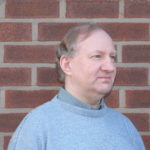 school that he took up what is now his main instrument, the saxophone. Later while at college studying piano tuning he added the flute.
school that he took up what is now his main instrument, the saxophone. Later while at college studying piano tuning he added the flute.
He has since studied music with the Open University. After college, he played in several rock bands, one of which was played on the BBC a couple of times. Most of his playing time nowadays is spent playing in saxophone ensembles; quartets and an octet, although he does a lot of jazz, and some big band playing. Mike began composing at school, and has been doing so ever since.
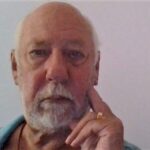 I started on the piano at an early stage (my father was a jazz pianist with his own band) and then moved to the trumpet where i played in local jazz bands and amateur orchestras. I became principal trumpet of the Kent Youth Orchestra. As a teacher of forty years i wrote a number of musicals (with colleagues), songs for choirs, carols, and pieces for motley groups of instrumentalists. I taught in five counties ending in Devon where I retired early. Now fully retired and living in Italy I have the leisure to do much more composing.
I started on the piano at an early stage (my father was a jazz pianist with his own band) and then moved to the trumpet where i played in local jazz bands and amateur orchestras. I became principal trumpet of the Kent Youth Orchestra. As a teacher of forty years i wrote a number of musicals (with colleagues), songs for choirs, carols, and pieces for motley groups of instrumentalists. I taught in five counties ending in Devon where I retired early. Now fully retired and living in Italy I have the leisure to do much more composing.
Myrto Korkokiou has a BA in Music (Ionian University) and an Mmus in Performance (LCMM –London). She is currently elaborating a doctoral research in flute performance with electronic means at the Ionian University. She has participated in festivals of 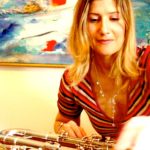 electronic and modern music in Greece and abroad such as: Electroacoustic Days in Corfu, Rethimno, Lixouri, Athens Megaron of Music, Philippos Nakas Hall, Aboutt, Beton7, Onassis Cultural Centre, Salford Sonic Fusion Festival (Manchester), 8th Convention of British Flute Society in RNCM (Manchester, 2012), 41st Annual National Flute Association Convention (New Orleans, 2013), 40th international Computer Music Conference (ICMC/SMS 2014), 43rd Annual National Flute Association Convention (Washington D.C). At the moment she performs music for flute and electronics in Greece and abroad as a freelancer performer. She teaches music at the Music and Motion Lab for people for special needs in Agia Paraskevi, Athens. http://myrtokorkokiou.wordpress.com/ www.youtube.com/user/MyrtoKorkokiou https://independent.academia.edu/MyrtoKorkokiou
electronic and modern music in Greece and abroad such as: Electroacoustic Days in Corfu, Rethimno, Lixouri, Athens Megaron of Music, Philippos Nakas Hall, Aboutt, Beton7, Onassis Cultural Centre, Salford Sonic Fusion Festival (Manchester), 8th Convention of British Flute Society in RNCM (Manchester, 2012), 41st Annual National Flute Association Convention (New Orleans, 2013), 40th international Computer Music Conference (ICMC/SMS 2014), 43rd Annual National Flute Association Convention (Washington D.C). At the moment she performs music for flute and electronics in Greece and abroad as a freelancer performer. She teaches music at the Music and Motion Lab for people for special needs in Agia Paraskevi, Athens. http://myrtokorkokiou.wordpress.com/ www.youtube.com/user/MyrtoKorkokiou https://independent.academia.edu/MyrtoKorkokiou
Myrto Korkokiou and Apostolos Loufopoulos have been collaborating since 2000 in composing and performing widely works for flute and electronic sounds, computer processed and prerecorded in real time and diffusion. Her main interest in music involves improvisation and performance with electronics means, as well as composition for flute and electronics. In their works the main target is to create sound environments, life like or imaginary, where the flute is the center of the sound action. The flute with the use of modern flute techniques creates a variety of timbres, which extend and enrich its sound spectrum when combined with electronic sounds either pre-recorded, or processed in real-time. Their pieces have been awarded in electroacoustic composition competitions such as Franco Evangelisti, 32 Bourges International Competition, Music Nova 2004, 2006, 2014, Dimitri Dragataki 2007- 2008) and they have been published by Forton Music: https://www.fortonmusic.co.uk/.
Born in Lecce in 1982, he started the study of piano and composition at a very early age. He furthered his studies with a degree at “Tito Schipa” Conservatorium, Lecce (Italy), with first- class honours in “Music: interpretation and composition” studying with Francesco Libetta. Then he studied at the Debreceni Egetemy Konservatòriuma (Hungary) with Jeno Jando, F. J. Thioiller, R. Cappello,S. Perticaroli, V. Balzani, V. Dvorkin, M. Abbado e L. Morales. He has won many international piano competitions, and collaborates with such famous opera singers as Daniela Dessì, Fabio Armiliato, and chamber music ensembles and instrumentalists, such as Vincent Lepape and Stefan Schulz.
class honours in “Music: interpretation and composition” studying with Francesco Libetta. Then he studied at the Debreceni Egetemy Konservatòriuma (Hungary) with Jeno Jando, F. J. Thioiller, R. Cappello,S. Perticaroli, V. Balzani, V. Dvorkin, M. Abbado e L. Morales. He has won many international piano competitions, and collaborates with such famous opera singers as Daniela Dessì, Fabio Armiliato, and chamber music ensembles and instrumentalists, such as Vincent Lepape and Stefan Schulz.
Nicole Buetti is an award winning composer, with over 300 recorded musical works in a wide variety of genres. She has written extensively for chamber ensembles and large ensembles of various configurations, as well as children’s 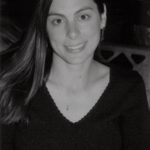 music and Halloween themed music. Nicole has spent several years in the Los Angeles area working as a composer in the film and television industries, and has had music commissioned and licensed for use all over the world. She was appointed the ‘composer in residence’ for the Assisi Performing Arts Music Festival in Italy in 2013. As an educator, Nicole has taught bassoon and composition at Colorado State University. She is now teaching at George Fox University and is the Contrabassoonist for the Vancouver Symphony Orchestra (USA). Nicole holds Bachelor of Music degrees in Theory/Composition and Bassoon Performance, as well as an MM in Bassoon and Contrabassoon Performance from the University of Northern Colorado.
music and Halloween themed music. Nicole has spent several years in the Los Angeles area working as a composer in the film and television industries, and has had music commissioned and licensed for use all over the world. She was appointed the ‘composer in residence’ for the Assisi Performing Arts Music Festival in Italy in 2013. As an educator, Nicole has taught bassoon and composition at Colorado State University. She is now teaching at George Fox University and is the Contrabassoonist for the Vancouver Symphony Orchestra (USA). Nicole holds Bachelor of Music degrees in Theory/Composition and Bassoon Performance, as well as an MM in Bassoon and Contrabassoon Performance from the University of Northern Colorado.
I started playing the flute when I was 12 years old. Very soon after I also started to play the clarinet and the saxophone. For many years I was a woodwind teacher specialising in flute and saxophone. 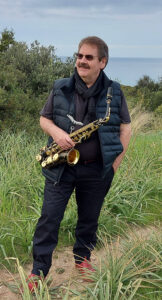 I was a founder member of the Northern Saxophone Quartet, and at a different time, a piccolo player in The Cyprus State Orchestra. I have played Flute with Sir James Galway, and Saxophone with Eugene Rousseau. During the last fifteen years, I have been The Director of Music in six International Schools. I am now looking forward to my retirement and having more time to write music and to start playing Flutes and Saxophones again.
I was a founder member of the Northern Saxophone Quartet, and at a different time, a piccolo player in The Cyprus State Orchestra. I have played Flute with Sir James Galway, and Saxophone with Eugene Rousseau. During the last fifteen years, I have been The Director of Music in six International Schools. I am now looking forward to my retirement and having more time to write music and to start playing Flutes and Saxophones again.
Originally from Lancashire, Oliver currently studies Composition at the University of York with Dr John Stringer. His composition and research interests are focused 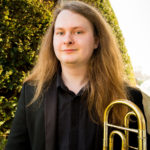 around acoustic spatial music and he will be pursuing a PhD by Composition titled “Use of space and performer placement as a primary compositional device in 21st Century and Avant-Garde spatial acoustic chamber music”. Oliver has also previously studied composition and related context with Professors Ambrose Field, William Brooks, Roger Marsh, and Drs Martin Suckling, Thomas Simaku, Federico Reuben and Chris Leedham. His music has been performed across the world including the U.K, Poland, U.S.A and Australia.
around acoustic spatial music and he will be pursuing a PhD by Composition titled “Use of space and performer placement as a primary compositional device in 21st Century and Avant-Garde spatial acoustic chamber music”. Oliver has also previously studied composition and related context with Professors Ambrose Field, William Brooks, Roger Marsh, and Drs Martin Suckling, Thomas Simaku, Federico Reuben and Chris Leedham. His music has been performed across the world including the U.K, Poland, U.S.A and Australia.
As a performer Oliver plays with popular function band Dysfunktion, Dixieland jazz band Dixin’ Around, and with the Bedlam Brass Quintet.
Otto Martin Christensen has more than twenty years teaching and research experience from different academic institutions in Norway, where he has been working within the field of philosophy at Bergen 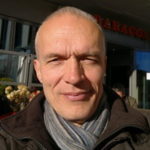 University, Stavanger University and Telemark University College.
University, Stavanger University and Telemark University College.
He has many years performing experience. He studied piano, flute and guitar and began composing when he was fifteen years old. His works have been extensively performed throughout Norway and beyond.
Paul studied singing, opera, composition and arranging at the Hartt School of Music in the US. He has studied voice with Beverly Johnson of the Juilliard School of Music, Elizabeth Coss of The Metropolitan Opera, Laura Sarti of the Guildhall School of Music & 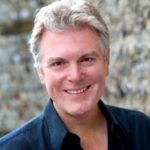 Drama, and with the wonderful singer, Anne Mason. He has had an international career as an opera and concert singer for over 25 years, including leading tenor roles with the New York Metropolitan Opera, the Royal Opera, Glyndebourne Festival Opera, and Milan’s La Scala opera houses, to name but a few. He was originally a specialist in the Rossini repertoire and frequently sang at the Pesaro Festival and numerous other Italian theatres, and has recorded several Rossini operas and CDs of songs for the Opera Rara label, Decca and Telarc labels. He has composed, performed and recorded jazz and theatre music with Kenny Clayton and toured as guest soloist with Lesley Garrett.
Drama, and with the wonderful singer, Anne Mason. He has had an international career as an opera and concert singer for over 25 years, including leading tenor roles with the New York Metropolitan Opera, the Royal Opera, Glyndebourne Festival Opera, and Milan’s La Scala opera houses, to name but a few. He was originally a specialist in the Rossini repertoire and frequently sang at the Pesaro Festival and numerous other Italian theatres, and has recorded several Rossini operas and CDs of songs for the Opera Rara label, Decca and Telarc labels. He has composed, performed and recorded jazz and theatre music with Kenny Clayton and toured as guest soloist with Lesley Garrett.
On the concert stage, he has performed with the Kantanti Ensemble both in London and Lewes, singing songs by Richard Strauss and Britten’s Serenade for Tenor, Horn, and Strings. He has also performed in Paris, at Amsterdam’s Concertgebuow, at the Kennedy Center and Lincoln Center in the US, throughout the UK and much of the rest of the world, singing repertoire from Bach and Handel through to Britten and Berg.
Paul and his wife created the award-winning children’s music label, Walking Oliver, (named after their dog) and he spends a lot of time in his recording studio writing and arranging for various music libraries and production companies. Together they teach and conduct a local singing group called Lewes Voice Works and Paul also teaches the trumpet.
Paul Hart studied Piano, Violin and Composition at the Royal College of Music. Having developed an early interest in jazz, he worked with Cleo Laine and John Dankworth, touring the world with them. He has written many works, including a guitar concerto for John Williams, a percussion concerto for Evelyn Glennie, and a host of music identity packages for radio stations including Classic FM, Jazz FM and the BBC World Service.
Stella Dickinson has enjoyed a diverse career in music as Principal Oboist with the Rambert Dance Company, having played over many years with the BBC Radio Orchestra, the Orchestra of the Royal Opera House Covent Garden and the BBC Symphony Orchestra. Stella has taught the oboe throughout her career, as well as being a published author, editor, academic and researcher. She can be heard playing the oboe identity Jingles on Classic FM radio. Her solo CD ‘Love’s Lore’ sixteen British Folksongs for Oboe, Harp and Strings, was a creative collaboration with Paul Hart which has been highly acclaimed.
For the last few years Paul has been performing on the West End production of “Wicked” playing on Bflat, Eflat, Bass Clarinet and Soprano Saxophone.
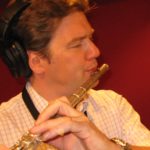 By adding flute to his portfolio Paul is one of the most versatile players on the London scene. Previous West End Shows he has performed on include “Billy Elliot”, “Guys and Dolls”, Les Miserables”, “The Producers”, “Mary Poppins”, “Chitty Chitty Bang Bang”, “The Full Monty”, “My Fair Lady”, “Ghost”, “Top Hat” and many more… Previous solo work includes Solo Clarinet in Bernstein’s Prelude Fugue and Riffs (Capital Radio Jazz Festival), Mozart Clarinet Concert (City of Rochester Symphony Orchestra) and Weber’s First Concerto, (Dartford Symphony Orchestra).
By adding flute to his portfolio Paul is one of the most versatile players on the London scene. Previous West End Shows he has performed on include “Billy Elliot”, “Guys and Dolls”, Les Miserables”, “The Producers”, “Mary Poppins”, “Chitty Chitty Bang Bang”, “The Full Monty”, “My Fair Lady”, “Ghost”, “Top Hat” and many more… Previous solo work includes Solo Clarinet in Bernstein’s Prelude Fugue and Riffs (Capital Radio Jazz Festival), Mozart Clarinet Concert (City of Rochester Symphony Orchestra) and Weber’s First Concerto, (Dartford Symphony Orchestra).
TV and studio work include LWT Parkinson, BBC Open University and BBC Can’t Sing Singers, but the majority of his work is theatre based. He has held many chairs on UK tours including “Sunset Boulevard”, “Kiss me Kate”, “Thoroughly Modern Millie”, “Half a Sixpence” and “Ain’t Misbehavin”.
Work outside of the musical theatre genre includes Scottish Opera, Royal Liverpool Philharmonic Orchestra, Welsh National Opera, Chameleon Arts Orchestra, CHROMA and the occasional late night cabaret at Madame Jo Jo’s.
Paul has also been invited as a guest lecturer for Birmingham Conservatoire of Music, Trinity Laban and Chethams School of Music and has recently enjoyed success as a composer. Several compositions have been published by Spartan Press and Trinity Exam Board – Music Tracks.
Pauline Gordon was a pupil at Ackworth Friends’ School where her father was Director of Music. She played piano and cello and went on to study music at Liverpool. She taught in Comprehensive schools and gained an Med at Hope University where she  studied the impact of music technology on music education. Che collaborated on the Jazz in Education initiative and her school was highly commended in the Daily Telegraph’s Young Jazz project. After some years as a Deputy Head she left teaching to work for Ofsted and began to learn the saxophone. She now plays in a number of Bug Bands, the Sovereign Saxophone Octet, the Northwest Saxophone Choir, Quattrosax quartet and the Maghull Wind Orchestra. She has written music for a wide variety of ensembles.
studied the impact of music technology on music education. Che collaborated on the Jazz in Education initiative and her school was highly commended in the Daily Telegraph’s Young Jazz project. After some years as a Deputy Head she left teaching to work for Ofsted and began to learn the saxophone. She now plays in a number of Bug Bands, the Sovereign Saxophone Octet, the Northwest Saxophone Choir, Quattrosax quartet and the Maghull Wind Orchestra. She has written music for a wide variety of ensembles.
 Peter studied music at York University where his interest in combining visual and sonic art was expressed in short abstract films and music-theatre (leading to a brief foray into theatrical lighting design). He plays in several orchestras and bands (mainly on trombone). His return to music composition owes much to the encouragement of Sharon Moloney (founder and MD of Opal Flutes) whose talent for bringing musicians together has provided many opportunities for composers to be heard. A late adopter of video, the Peter Bruce YouTube channel will show that cut-and-splice abstract films were not the final take in his audio-visual output.
Peter studied music at York University where his interest in combining visual and sonic art was expressed in short abstract films and music-theatre (leading to a brief foray into theatrical lighting design). He plays in several orchestras and bands (mainly on trombone). His return to music composition owes much to the encouragement of Sharon Moloney (founder and MD of Opal Flutes) whose talent for bringing musicians together has provided many opportunities for composers to be heard. A late adopter of video, the Peter Bruce YouTube channel will show that cut-and-splice abstract films were not the final take in his audio-visual output.
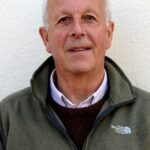 Peter Merry studied music at Dartington and Surrey University and for several years had posts as a school music teacher, including Head of Brass at Tonbridge School. He then became a freelance horn player in London where he played mainly in the chamber orchestras and chamber groups such as the Endymion Ensemble. For many years he played with English Touring Opera and made over 50 recordings with the Academy of St. Martins in the Fields and the City of London Sinfonia. He has since taught the horn at Junior Trinity and at Exeter University and coached chamber music with the British Horn Society, and on courses such as Dartington International Summer School, Cubertou in France, Segovia in Spain and the English Camerata International Chamber Music Summer School where many of his arrangements for wind players have been performed.
Peter Merry studied music at Dartington and Surrey University and for several years had posts as a school music teacher, including Head of Brass at Tonbridge School. He then became a freelance horn player in London where he played mainly in the chamber orchestras and chamber groups such as the Endymion Ensemble. For many years he played with English Touring Opera and made over 50 recordings with the Academy of St. Martins in the Fields and the City of London Sinfonia. He has since taught the horn at Junior Trinity and at Exeter University and coached chamber music with the British Horn Society, and on courses such as Dartington International Summer School, Cubertou in France, Segovia in Spain and the English Camerata International Chamber Music Summer School where many of his arrangements for wind players have been performed.
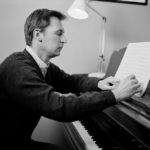 Philip is a freelance musician living in London. He concentrates mainly on composing, but is also a pianist, organist and teacher. His compositions – instrumental, choral, and theatre music – are tonal and accessible in style, and widely performed and published.
Philip is a freelance musician living in London. He concentrates mainly on composing, but is also a pianist, organist and teacher. His compositions – instrumental, choral, and theatre music – are tonal and accessible in style, and widely performed and published.
Philip studied music at Cambridge University, where he was an organ scholar and musical director/composer for the Footlights. He is an Associate of the Royal College of Organists.
As a pianist, Philip regularly accompanies choirs, singers and instrumentalists; he also performs as a soloist, with recent engagements at the Mansion House, London, St James’ Palace, and Windsor Castle.
 Philip Joy is a retired Baptist Minister and M.E. sufferer who lives in Essex, UK. Trained as a cellist and largely self-taught in composition, Philip did not discover his personal voice until the early years of the new millennium, which resulted in a substantial score for Wind Orchestra called Variations on a Crowd written for Timothy Reynish, and a Trio for Harp Violin and Cello called Discourse. These works established an aesthetic of beauty, the use of harmonic structures built on a triad higher up the overtone series and a direct approach to rhythm. In this way Philip is proud to draw inspiration from the riches of the Western mainstream whilst bringing to it the freshness of New Consonant Music. He has had a number of professional performances including chamber works by the Turner Ensemble, the Barkham Harp Quartet, Sara Stowe, Charles Hine, and Serenata Winds as well as performing his own cello music in local concert venues; orchestral performances by established amateur groups include Ex Libris Aureis for the Lavenham Sinfonia and the more recent substantial Donata for Essex Chamber Orchestra, scored for Triple Woodwind. He is a valued member of the Central Composers’ Alliance, and through more recent creative partnerships with Colchester New Music has written scores for the British Clarinet Ensemble, the National Flute orchestra, and with the encouragement of Forton Music is currently engaged in a work for the Lug Double Reed Band. A string rather than a wind specialist, Philip nonetheless delights in the texture and colour offered by Wind and Brass music and is particularly fascinated by the possibilities offered by ensembles of single wind families. In addition he has a large back-catalogue of compositions written for various ensembles no longer in existence due to the 2008 financial crash: several choral miniatures for the RSCM, a Cello Concertino Retro Variations, a String Quartet Melisma and a duet for Violin and Viola Mozart Balls. He has written a 45-minute Sacred Music Drama based on a the Medieval English Mystic Cloude of Unknowinge, (to a Libretto in the Middle English prepared by the composer) and is currently at work on his first symphony.
Philip Joy is a retired Baptist Minister and M.E. sufferer who lives in Essex, UK. Trained as a cellist and largely self-taught in composition, Philip did not discover his personal voice until the early years of the new millennium, which resulted in a substantial score for Wind Orchestra called Variations on a Crowd written for Timothy Reynish, and a Trio for Harp Violin and Cello called Discourse. These works established an aesthetic of beauty, the use of harmonic structures built on a triad higher up the overtone series and a direct approach to rhythm. In this way Philip is proud to draw inspiration from the riches of the Western mainstream whilst bringing to it the freshness of New Consonant Music. He has had a number of professional performances including chamber works by the Turner Ensemble, the Barkham Harp Quartet, Sara Stowe, Charles Hine, and Serenata Winds as well as performing his own cello music in local concert venues; orchestral performances by established amateur groups include Ex Libris Aureis for the Lavenham Sinfonia and the more recent substantial Donata for Essex Chamber Orchestra, scored for Triple Woodwind. He is a valued member of the Central Composers’ Alliance, and through more recent creative partnerships with Colchester New Music has written scores for the British Clarinet Ensemble, the National Flute orchestra, and with the encouragement of Forton Music is currently engaged in a work for the Lug Double Reed Band. A string rather than a wind specialist, Philip nonetheless delights in the texture and colour offered by Wind and Brass music and is particularly fascinated by the possibilities offered by ensembles of single wind families. In addition he has a large back-catalogue of compositions written for various ensembles no longer in existence due to the 2008 financial crash: several choral miniatures for the RSCM, a Cello Concertino Retro Variations, a String Quartet Melisma and a duet for Violin and Viola Mozart Balls. He has written a 45-minute Sacred Music Drama based on a the Medieval English Mystic Cloude of Unknowinge, (to a Libretto in the Middle English prepared by the composer) and is currently at work on his first symphony.
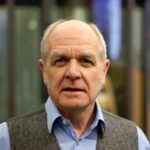 Phillip Rawle was born Birmingham, U.K. He is a singer, pianist, saxophonist and composer. He trained at the Birmingham School of Music and is a retired school music teacher. A Founder member of the City of Birmingham Symphony Orchestra Chorus, he has travelled extensively throughout the world with the CBSOand other leading orchestras performing at over 80 different venues.
Phillip Rawle was born Birmingham, U.K. He is a singer, pianist, saxophonist and composer. He trained at the Birmingham School of Music and is a retired school music teacher. A Founder member of the City of Birmingham Symphony Orchestra Chorus, he has travelled extensively throughout the world with the CBSOand other leading orchestras performing at over 80 different venues.
Phillip is also an alto sax and clarinet player and arranger. He has written many pieces for students, both choral and instrumental including two Musicals for school children and many more major choral works including settings of Shakespeare Sonnets, and The Great War poets.
For more information see Phillip’s website www.phil.rawle.org
Richard Lambert was born in Bath, UK. His musical studies were at universities in Bristol, London and Surrey. His teaching career spanned 34 years in four schools (32 of which were as Director of Music), but  he now combines a career as composer, examiner and organist. He is a Senior Examiner, Trainer and Moderator for the London College of Music, travelling, since 1989, to many centres in Europe, North and South America, Africa and the Far East. He continues to enjoy this work, drawing on his long experience of music-making and working with young people. Richard has written a highly successful GCSE music guide, published by Longman (Pearson Education). Whilst his earlier compositions were influenced by twentieth-century mainstream styles, with traces of jazz and popular music, his more recent music uses a freely atonal idiom or a serial technique, combined with tightly-knit structures.
he now combines a career as composer, examiner and organist. He is a Senior Examiner, Trainer and Moderator for the London College of Music, travelling, since 1989, to many centres in Europe, North and South America, Africa and the Far East. He continues to enjoy this work, drawing on his long experience of music-making and working with young people. Richard has written a highly successful GCSE music guide, published by Longman (Pearson Education). Whilst his earlier compositions were influenced by twentieth-century mainstream styles, with traces of jazz and popular music, his more recent music uses a freely atonal idiom or a serial technique, combined with tightly-knit structures.
Richard Nye is a composer and teacher living in the UK. His first published work, Three Pyrotechnics for Solo Clarinet (1993 – pub. Cascade Music Publishing) is now included as part of the Trinity College Advanced Clarinet repertoire.
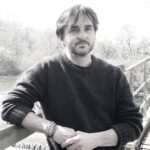 Richard was a chorister at Gloucester Cathedral and began composing at a young age. Guided by the Cheltenham-based composer Tony Hewitt-Jones whilst he was still at school, he later went on to study music in London. He received his South Bank debut with 8 ‘till Late (8 hands on 2 pianos) performed at the South Bank Centre in 2001 by Piano 40, whilst living on the Isles of Scilly. The work was later released on CD by Regent Records and has received numerous performances in London and abroad, and in 2016 received its American premiere.
Richard was a chorister at Gloucester Cathedral and began composing at a young age. Guided by the Cheltenham-based composer Tony Hewitt-Jones whilst he was still at school, he later went on to study music in London. He received his South Bank debut with 8 ‘till Late (8 hands on 2 pianos) performed at the South Bank Centre in 2001 by Piano 40, whilst living on the Isles of Scilly. The work was later released on CD by Regent Records and has received numerous performances in London and abroad, and in 2016 received its American premiere.
Recently he has composer music inspired by works of art, most notably Circus! A work composed to accompany the Circus Prints by the late American artist, John Collier. Richard also works with samples, historical recordings and visual media, winning an ‘honourable mention’ for his collaborative work And the Earth Stood Still at the first Fresh Minds Festival in Texas. In 2013 he composer The Marvellous Machine. This piece for 8 hands at one piano was commissioned by the British pianist Nadia Lasserson for four of her pupils who, using the work, became the eventual winners in the ensemble category of the Jaques Samuel piano competition in 2013. It was performed at the Wigmore Hall, London, in November of the same year. The piece was also featured at the 2015 and 2016 Summer School for Pianists ‘Piano Now!’ concert.
Richard continues to combine experimental works such as Underworld performed at the University of Bremen in 2014 by Juan Maria Solare and Still for a Minute? (a solo clarinet piece performed at the University of Wisconsin in 2016), with contemporary choral and instrumental compositions.
New works have included 3 Advent Antiphons for SATB, organ and hand chimes which was performed in Wimborne Minster in December 2014 and Tronow, a new 8 hands on 2 pianos piece for the group Grimoire. His 2015 Missa Brevis and the 2016 anthem Let the World Know His Name are recent additions to his choral catalogue.
He is currently working on a school musical and film with the pupils of Dumpton School where he works.
Ricky Chaggar is an award winning professional composer. He was born in London in 1982 and began playing music by ear at 3 years old on the piano. He soon started playing his own 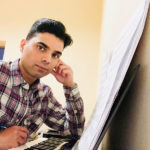 compositions and improvisations at school concerts and at 17, won a composing contest set by the Royal Albert Hall and Redbridge Music Service in London.
compositions and improvisations at school concerts and at 17, won a composing contest set by the Royal Albert Hall and Redbridge Music Service in London.
Having studied law at university and with a brief period working in business, he decided to return to his classical music training with serious study in music theory and composition, which include studies at the Royal College of Music and the Trinity College London syllabus.
As a committed composer and musician, his work has begun to draw acclaim and attention as an emerging talent within contemporary music. Other composing awards to date include winning entries in the Druskomanija International Contemporary Music Festival and the Sul Ross State University Wind Ensemble competitions. With a natural inclination towards melody and foundation derived from the tonal idiom, his music is accessible and has been heard on national television and radio both in the UK and worldwide (BBC, Channel 4, RAI Uno). With an interest in music education, he was invited by the Royal College of Music to conduct a workshop regarding composing techniques within classrooms.

Rob Hall (b.1969) studied Music on the joint course at Manchester University and the Royal Northern College of Music, prioritising Composition, Clarinet, and later, Saxophone. In his first term he won a composition competition judged by James MacMillan CBE. Gaining further awards including two Proctor Gregg Awards and the Terence Greaves Award for Big Band Writing, he then won a scholarship to Berklee College of Music USA, primarily to study Jazz.
He has built a diverse catalogue with many commissions, writing for choirs, chamber and jazz orchestras, solo works, small groups, and multi-media work. His music has been performed in such venues as the Royal Festival Hall and Barbican in London, the Martin Harris Centre and RNCM Concert Hall in Manchester, and the Royal Concert Hall and University Concert Hall in Glasgow. A commission from ABRSM received worldwide publication in 2017-18 Piano Exam Pieces with further content used in the 2021-22 & 2023-24 piano syllabus. This led to more publications with Spartan Press, Brasswind and Forton Music.
Cross-artform projects have seen him collaborate with artist James Hawkins, digital visual artist John McGeogh and sculptress and photographer Susheila Jamieson with performances at the Highland Festival 2001 and Edinburgh International Jazz Festival 2011.
As a leader and co-leader he has released nine albums of original and improvised music for the British contemporary music label FMR, also the main recording outlet for a longstanding partnership with pianist and composer Chick Lyall.
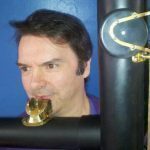 Robert Rainford studied music at Durham University before embarking on a career as a freelance musician, publisher and music teacher in the North West of England. Playing and teaching wind instruments, as well as piano and double bass, has given him an invaluable insight into the technical issues of the different wind instruments.
Robert Rainford studied music at Durham University before embarking on a career as a freelance musician, publisher and music teacher in the North West of England. Playing and teaching wind instruments, as well as piano and double bass, has given him an invaluable insight into the technical issues of the different wind instruments.
A member of the National Flute Orchestra, Preston Flute Group and Casual Sax Quartet, Robert is an active musician, and his arrangements have been played world wide by a variety of different ensembles. Rapidly gaining a reputation for his low flute playing, the picture shows Rob with his Subcontrabass flute.
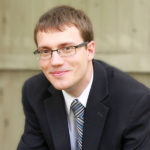 Robert Strobel composes art music in a variety of mediums. His music has been performed at Art Song Lab, Aspen Composers Conference, the Electroacoustic Barn Dance, the SCI National Conference, the Source Song Festival, the New York City Electroacoustic Music Festival, the New Music Festival and University of Nebraska-Kearney, the TUTTI Festival, and the SCI Region VI conference. He won third place in the Bruno Maderna International Composers Competition. His work Prairie Dog Rhapsody received a special mention at the Alfred Schnittke Composer’s Forum and Competition. He has also been a finalist in other competitions or call for scores. His music has been broadcast on WPRB Princeton in Marvin Rosen’s 25-hour new music marathon, and on Hawaii Public Radio, in the program “Singing and Other Sins.” Among the commissions he has received include ones for the beginning of his Western Preludes and Fugues Project, for Hollywood Hills High School Band, for [TriO], for oboist Dan Willett, from the LDS Barlow Commission, and a Mizzou New Music Initiative-funded work for some string players of the St. Louis Symphony, among others. His symphonic work From the Book of the Dead was a winner in the Missouri Orchestra Composer’s project. The recording of his piano work Refugees was selected for the SCI CD Flare. He also undertook an artist residency at Brush Creek Foundation for the Arts and attended an orchestration workshop with the Albany Symphony. Robert has a doctorate degree in composition from Florida State University, as well as degrees from the University of Missouri-Columbia (MM Composition), and the University of Northern Colorado (MM Oboe Performance, BM Composition and Oboe Performance).
Robert Strobel composes art music in a variety of mediums. His music has been performed at Art Song Lab, Aspen Composers Conference, the Electroacoustic Barn Dance, the SCI National Conference, the Source Song Festival, the New York City Electroacoustic Music Festival, the New Music Festival and University of Nebraska-Kearney, the TUTTI Festival, and the SCI Region VI conference. He won third place in the Bruno Maderna International Composers Competition. His work Prairie Dog Rhapsody received a special mention at the Alfred Schnittke Composer’s Forum and Competition. He has also been a finalist in other competitions or call for scores. His music has been broadcast on WPRB Princeton in Marvin Rosen’s 25-hour new music marathon, and on Hawaii Public Radio, in the program “Singing and Other Sins.” Among the commissions he has received include ones for the beginning of his Western Preludes and Fugues Project, for Hollywood Hills High School Band, for [TriO], for oboist Dan Willett, from the LDS Barlow Commission, and a Mizzou New Music Initiative-funded work for some string players of the St. Louis Symphony, among others. His symphonic work From the Book of the Dead was a winner in the Missouri Orchestra Composer’s project. The recording of his piano work Refugees was selected for the SCI CD Flare. He also undertook an artist residency at Brush Creek Foundation for the Arts and attended an orchestration workshop with the Albany Symphony. Robert has a doctorate degree in composition from Florida State University, as well as degrees from the University of Missouri-Columbia (MM Composition), and the University of Northern Colorado (MM Oboe Performance, BM Composition and Oboe Performance).
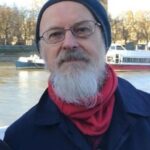 Roger Cawkwell studied composition and a range of instruments at the RAM, going on to play with groups as diverse as The London Sinfonietta, The Foundations and the Dankworth Band. He taught composition and musicianship at various London colleges for over 40 years and drops in to play bass with Opal Flutes whenever he can.
Roger Cawkwell studied composition and a range of instruments at the RAM, going on to play with groups as diverse as The London Sinfonietta, The Foundations and the Dankworth Band. He taught composition and musicianship at various London colleges for over 40 years and drops in to play bass with Opal Flutes whenever he can.
Roma Cafolla is a Northern Irish composer of Irish/Italian background and her music has a Latin, Mediterranean flavour coupled with an Irish folk tradition which is discernible in much of her work. Unashamedly full of melody 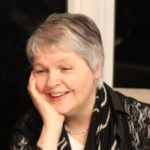 she has produced works in many moods and styles, ranging from the naive and simple, to the technically complex, deeply emotional and romantic. In complete contrast there are also works that are full of humour and wit and possess a light hearted Celtic charm. She is a prolific composer who writes on-demand very quickly once an idea for a work has formed.
she has produced works in many moods and styles, ranging from the naive and simple, to the technically complex, deeply emotional and romantic. In complete contrast there are also works that are full of humour and wit and possess a light hearted Celtic charm. She is a prolific composer who writes on-demand very quickly once an idea for a work has formed.
Deeply committed to music education she has written a considerable amount for less advanced players and children in graded books called “Playarounds” as well as more demanding works such as Sonatas and Concertos for those with more developed technique.
Her musical collaboration with clarinettist Leslie Craven (Principal Clarinettist of Welsh National Opera) has inspired her to write many new works for that instrument and a CD of her works involving clarinet was released on the Hedone label available in 2014. Other works by Cafolla include pieces for; voice, strings, wind ensembles large and small, clarinet choir, brass ensembles of varying sizes plus numerous diverse combinations of wind and strings.
Russell Denwood was born in Wallsend Northumberland in 1950. He learned his basics in a cathedral choir and at the local music college, where he studied Violin, Piano, Bassoon and composition. His main training was at Trinity College if Music, London, studying  Piano, Composition and Bassoon. He was a freelance bassoonist for a few years in London, then, on getting married decided that that was a precarious way to make a living, therefore went into instrumental teaching. Having taught in various areas in the country for 20 years (Newcastle, Tynemouth, Aberdeen, Dumfries and Kirkcudbright), he then joined June Emerson Wind Music for a number of years, on the sales, publishing, editing side of the business. Now retired (if a musician is ever retired!) he lives in the beautiful South West of Scotland, working as a composer and arranger. His arrangements and compositions are published by (amongst others) Boosey & Hawkes, Emerson Edition, Phoenix Music, Kendor, Hilltop, Reynard Music etc. Away from music, he has a particular interest in Japanese art
Piano, Composition and Bassoon. He was a freelance bassoonist for a few years in London, then, on getting married decided that that was a precarious way to make a living, therefore went into instrumental teaching. Having taught in various areas in the country for 20 years (Newcastle, Tynemouth, Aberdeen, Dumfries and Kirkcudbright), he then joined June Emerson Wind Music for a number of years, on the sales, publishing, editing side of the business. Now retired (if a musician is ever retired!) he lives in the beautiful South West of Scotland, working as a composer and arranger. His arrangements and compositions are published by (amongst others) Boosey & Hawkes, Emerson Edition, Phoenix Music, Kendor, Hilltop, Reynard Music etc. Away from music, he has a particular interest in Japanese art
Russell Hepplewhite studied composition and piano at Chetham’s School of Music and the Royal College of Music. As a composer he has composed operatic, choral and chamber works which have been performed extensively across 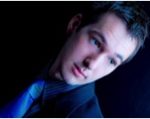
Ruth Ballantyne is a flautist and teacher based in Cornwall who graduated with a degree in music from Exeter University in 1997. Since then she has worked as a freelance flute player and an enthusiastic 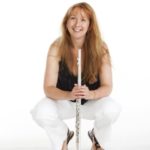 specialist teacher with students of all ages and abilities including undergraduate, postgraduate and professional musicians.
specialist teacher with students of all ages and abilities including undergraduate, postgraduate and professional musicians.
During her career Ruth has been proactive in creating, directing and encouraging a wide variety of musical projects including the formation, in 2003 of the registered charity, 4Flutes to inspire and encourage flute players through workshops and events. More recently (2011) Ruth started RWindband, a new symphonic wind band, based on a strong ethos of teamwork, progression and inspiration.
Ruth’s been actively involved with the Musicians Union for over 15 years and more recently in the formation of the Musicians’ Union teachers section in 2009. Currently chair of the Musicians’ Unions Teachers Section and HUB rep mentor both these roles enable Ruth to promote and encourage development and professionalism in instrumental teaching. Ruth has done numerous presentations on teaching around the country including teaching workshops at the Royal Welsh College of Music & Drama and the British Flute Society Convention.
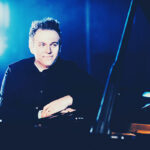 Ryan trained in Musical Theatre Performance as an undergraduate before completing an MA in Musical Theatre Composition at Goldsmiths University. He has musically directed, composed, and lectured at various institutions across the country. Currently Ryan is the Course Leader and Senior Lecturer Practitioner in Musical Theatre at ARU, Cambridge. His first musical, Letters to Myself was premiered at the Tristan Bates Theatre in London in 2011. He has continued to compose professionally writing new works such as Life and Death In An Ocean Full Of Hope, as part of Paines Plough’s Roundabout Theatre Festival and is currently undertaking a PhD in Composition at Anglia Ruskin University in Cambridge .
Ryan trained in Musical Theatre Performance as an undergraduate before completing an MA in Musical Theatre Composition at Goldsmiths University. He has musically directed, composed, and lectured at various institutions across the country. Currently Ryan is the Course Leader and Senior Lecturer Practitioner in Musical Theatre at ARU, Cambridge. His first musical, Letters to Myself was premiered at the Tristan Bates Theatre in London in 2011. He has continued to compose professionally writing new works such as Life and Death In An Ocean Full Of Hope, as part of Paines Plough’s Roundabout Theatre Festival and is currently undertaking a PhD in Composition at Anglia Ruskin University in Cambridge .
 After enjoying a career as chartered engineer and chartered IT professional Simon Tait returned to music performance and composition in 2013, studying classical piano and attaining an ABRSM Diploma in piano performance in 2015 and subsequent studying orchestration at Morley College in London.
After enjoying a career as chartered engineer and chartered IT professional Simon Tait returned to music performance and composition in 2013, studying classical piano and attaining an ABRSM Diploma in piano performance in 2015 and subsequent studying orchestration at Morley College in London.
He is particularly drawn to the evocative in music and the use of improvisation as part of the composition process. His music is atmospheric and he often produces organic intimate pieces which are lyrical and expressive.
He writes for orchestra, piano and for piano with other instruments. He is a member of the Committee of the London Composer’s Forum and has carried out a number of projects with the London Contemporary Chamber Orchestra (LCCO) include a film score and concert pieces. He performs solo and with other musicians. He sings tenor with Bath Abbey’s Abbey Singers and occasionally with other choirs.
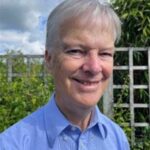 Born in Beverley, Stephen Binnington studied at the Royal College of Music, London. For many years, he combined work in Education, and Arts Administration with freelance work as an organist, piano accompanist, and choral conductor. He has performed throughout the UK and abroad, giving concerts and recitals in the smallest of village churches to concert halls and cathedrals. For 16 years he was conductor of the Blandford Choral Society. Since 2013 he has worked exclusively as a freelance musician. From 2013-2020 he was Organist & Choirmaster at St.Gregory’s Church, Marnhull, establishing an annual series of concerts and directing a 4-part choir. Stephen has written scripts, and composed and arranged music for a series of musical presentations which have been performed in theatres, concert halls and schools, under the umbrella of Musical Storytime and Beyond the Stave. His published compositions comprise mostly of chamber music, but include organ and choral music, some of which has featured in the ABRSM exam syllabus. His wife, Deborah, is a musician and they have two grown-up children and a grandchild.
Born in Beverley, Stephen Binnington studied at the Royal College of Music, London. For many years, he combined work in Education, and Arts Administration with freelance work as an organist, piano accompanist, and choral conductor. He has performed throughout the UK and abroad, giving concerts and recitals in the smallest of village churches to concert halls and cathedrals. For 16 years he was conductor of the Blandford Choral Society. Since 2013 he has worked exclusively as a freelance musician. From 2013-2020 he was Organist & Choirmaster at St.Gregory’s Church, Marnhull, establishing an annual series of concerts and directing a 4-part choir. Stephen has written scripts, and composed and arranged music for a series of musical presentations which have been performed in theatres, concert halls and schools, under the umbrella of Musical Storytime and Beyond the Stave. His published compositions comprise mostly of chamber music, but include organ and choral music, some of which has featured in the ABRSM exam syllabus. His wife, Deborah, is a musician and they have two grown-up children and a grandchild.
Stuart Spiers was educated at Camp Hill Grammar School, Birmingham and Nottingham College of Education. He has played professionally in London and Shropshire and taught for over 50 years. During this time, he has also given improvisation workshops and 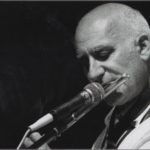 lecture demos.
lecture demos.
He has been writing and arranging in a jazz context for various combinations for over 30 years. He has lived with his wife in Shrewsbury, Shropshire since 1974 and has been musically active in Shropshire all that time
Terry Kenny learned to play the clarinet as a band boy in the Army. Unable to find long term civilian employment as a player, and as he was about to get married, he signed on and after 3 years study at 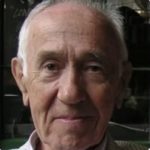 Kneller Hall, became conductor of some of the Army’s top bands.
Kneller Hall, became conductor of some of the Army’s top bands.
On leaving he resumed playing and teaching but arthritis forced him to change to descant recorder. He arranged for all sorts of combinations and has had about 300 of these pieces published in the UK and half a dozen other countries. He hopes they give some pleasure to those who play them.
Tim is an award winning and widely published Yorkshire based composer whose through his accessible and appealing music has built up a range of 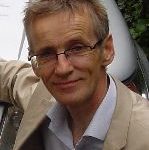 performances both here at home and also overseas.
performances both here at home and also overseas.
His music ranges from small pieces for beginner woodwind ensembles through to large scale Choral and Orchestral works, ( the orchestra piece Elegy for an English summer recorded by the CZech Philharmonic has seen him shortlisted in the Classic FM hall of fame for three years running). His has been guest composer in residence in both Canada an the USA and his pieces have found their way onto exam lists and festival set pieces.
Tim is also a busy choral conductor and at present directs the hugely successful Leeds Male Voice choir, The International Touring choir Masterworks Chorale and also the Heritage singers, he is Principal of the Yorkhire college of Music in Leeds, has a love of Saabs and Preserved English Electric Diesel locos!
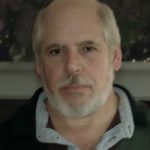 Tom Febonio was born in Salem, Massachusetts in 1950 and began his career in music at the age of sixteen playing the electric bass in a rock & roll band. This kept him occupied for about a decade, during which time he took up songwriting and recording, traditional music and jazz. As an adult he studied piano with Edith Mehaffey, and the viola, theory and conducting with Joseph Leary.
Tom Febonio was born in Salem, Massachusetts in 1950 and began his career in music at the age of sixteen playing the electric bass in a rock & roll band. This kept him occupied for about a decade, during which time he took up songwriting and recording, traditional music and jazz. As an adult he studied piano with Edith Mehaffey, and the viola, theory and conducting with Joseph Leary.
Tom’s compositions have been performed throughout the United States and Europe, and include solo and chamber pieces for piano, guitar, mandolin, strings and winds. Audio recordings include releases by Duo Ahlert & Schwab, Sherry Finzer & Darin Mahoney, Jack Garvey, Suzanne Williams, Full Cold Moon, and Keltish.
Tony Bridgewater studied piano with Malcolm Wilson at the Birmingham Schoolof Music and gained a B.A. in music at St John’s College, Cambridge, studying composition with Peter Tranchell and Piano with Renee Reznek. He has composed a wide range of music 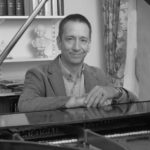 including pieces for Orchestra, Concert band and Choir, and sonatas for piano, violin, trumpet and cello. He gave the first performance of his Second Piano Concerto with the Central England Ensemble conducted by Anthony Bradbury in February 2010, and conducted the first performance of his Double Concerto for Flute and Clarinet with the Central England Ensemble and soloists Tony and Linda May at Carrs Lane Church, Birmingham, in February 2013. In November 2015, the pianist Margaret Fingerhut is to give the first performance of his Concert Piece for piano and orchestra in Birmingham, and he is currently working on several commissions including a new orchestral work for 2017. He enjoys playing the piano in chamber music, as soloist and accompanist, and has played for the ‘BBC Young Musician of the Year’ competition and ‘Dudley Young Musician of the Year’. He gives regular recitals with local musicians, especially Anna Downes, and appears regularly in the ‘Local and Live’ concert series in Stourbridge. He conducted the Stourbridge Choral and Orchestral Society for 6 years, and was made President of the Society in 2008. In 2014 he was invited to be the director of the National Flute Orchestra, and has conducted them in a wide range of music including the Sonata by Andrew Downes and other C20/21 works including his own Sonata for Flutes. In 2014 he was elected a trustee of the Birmingham Conservatoire Association, and he serves on the newly formed Conservatoire Development Council, supporting the development of the new Conservatoire now being built at Millenium Point. Tony Bridgewater was Senior Curriculum Coordinator for Creative Arts at Ridgewood High School from 1985-2003, and Director of Music at Old Swinford Hospital School from 2003 -2015. During this time his students toured in Europe and America, and performed in venues such as Barcelona Cathedral, Montserrat Abbey, Salzburg Cathedral and St Mark’s Cathedral, Venice. He has now left teaching to be a freelance musician. His other interests include classic cars, art, gardening, films, photography and family life with his wife Veronica and their two children.
including pieces for Orchestra, Concert band and Choir, and sonatas for piano, violin, trumpet and cello. He gave the first performance of his Second Piano Concerto with the Central England Ensemble conducted by Anthony Bradbury in February 2010, and conducted the first performance of his Double Concerto for Flute and Clarinet with the Central England Ensemble and soloists Tony and Linda May at Carrs Lane Church, Birmingham, in February 2013. In November 2015, the pianist Margaret Fingerhut is to give the first performance of his Concert Piece for piano and orchestra in Birmingham, and he is currently working on several commissions including a new orchestral work for 2017. He enjoys playing the piano in chamber music, as soloist and accompanist, and has played for the ‘BBC Young Musician of the Year’ competition and ‘Dudley Young Musician of the Year’. He gives regular recitals with local musicians, especially Anna Downes, and appears regularly in the ‘Local and Live’ concert series in Stourbridge. He conducted the Stourbridge Choral and Orchestral Society for 6 years, and was made President of the Society in 2008. In 2014 he was invited to be the director of the National Flute Orchestra, and has conducted them in a wide range of music including the Sonata by Andrew Downes and other C20/21 works including his own Sonata for Flutes. In 2014 he was elected a trustee of the Birmingham Conservatoire Association, and he serves on the newly formed Conservatoire Development Council, supporting the development of the new Conservatoire now being built at Millenium Point. Tony Bridgewater was Senior Curriculum Coordinator for Creative Arts at Ridgewood High School from 1985-2003, and Director of Music at Old Swinford Hospital School from 2003 -2015. During this time his students toured in Europe and America, and performed in venues such as Barcelona Cathedral, Montserrat Abbey, Salzburg Cathedral and St Mark’s Cathedral, Venice. He has now left teaching to be a freelance musician. His other interests include classic cars, art, gardening, films, photography and family life with his wife Veronica and their two children.
Tony Jefferson was a late developer as a composer. It was only after a career spent working in offices and later in care homes that he began to concentrate on music, in retirement, building on the foundations 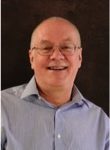
That voice is always tonal, though not necessarily diatonic – much of his music doesn’t even use key signatures. He is also fond of subtle and sometimes irregular rhythms.
Most of his output to date consists of short pieces for small ensembles or solo instruments, but there are also a few larger scale pieces, including a violin concerto, and a set of songs for baritone and orchestra based on Walt Whitman’s poetry.
Tony is lucky to have had clarinet lessons from two inspirational musicians. His early studies in Bournemouth were with Alan Melly, several of whose pupils have achieved great success in the profession. He later studied under the eminent clarinettist Sidney Fell at the 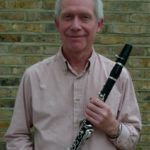 Royal College of Music, where he gained a Performer’s Diploma with Honours.
Royal College of Music, where he gained a Performer’s Diploma with Honours.
After spending three years as Principal Clarinet in the Royal Ballet Touring Company, Tony occupied a similar position in the orchestra of English National Opera from 1976-2012. He has also appeared as guest principal with most of the major opera companies and symphony and chamber orchestras in London and around the country.
Tony was a founder member of the ensemble Capricorn, whose extensive engagements included concerts and broadcasts throughout Britain and abroad, two university residencies, and several recordings on the Hyperion label. He has also played with other chamber groups such as the Nash Ensemble and the London Sinfonietta.
As a soloist and recitalist, Tony has performed for BBC Radio 3 and at many venues including Wigmore Hall and St John’s Smith Square. He is a visiting examiner, adjudicator and coach at all the London colleges of music, and is a member of the artistic committee of the Park Lane Group, which provides performing opportunities for talented young musicians.
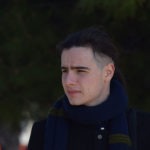
Vaggelis Dougalis was born at 1999 in Kozani, Greece. He is a young Greek musician, who recently entered the University of Ionia, Department of Musical Studies. He began to learn music at the age of 11 at a public conservatory. His flute and theory lessons were continued as he successfully passed his exams for the musical high school. At the age of 14, right after he finished his 1st level of harmony lesson, he started arranging many pieces and turning his theory knowledge into composing ideas. His tutors granted him free participation or attendance into many seminars and lectures, on musical fields of composition, conducting, musical influence on the brain etc. , flute techniques and more. As he was growing older, he participated in many events and concerts. Eventually, his own musical pieces were performed by the school’s orchestra and conservatory’s flute ensemble. Vaggelis is known for his arrangements on many instruments and his skills at conducting, and he’s currently studying advanced theory of music and composition. His relation with musical performance is growing stronger, as he also takes part in Ionian University’s Voice Ensemble (as a tenor), an advanced polyphonic group that organises many events, like Opera plays and choral shows. In his free time, he enjoys singing and making musical jokes, while playing cheerful melodies on the piano. His favourite composers are Mozart, Haydn and Arvo Part.
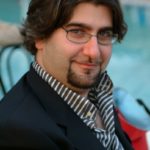 Vincenzo Sorrentino was born in Nola, Italy in 1973. He studied at the Conservatory D. Cimarosa of Avellino. Initially trained as a pianist, he latterly concentrated on composition and his works have won numerous competitions, reaching large audiences and gaining much acclaim.
Vincenzo Sorrentino was born in Nola, Italy in 1973. He studied at the Conservatory D. Cimarosa of Avellino. Initially trained as a pianist, he latterly concentrated on composition and his works have won numerous competitions, reaching large audiences and gaining much acclaim.
His flute ensemble works have proved especially popular, with worldwide performances at concerts and major flute events, and the flute world was shocked to hear of his untimely death at the end of 2013.
 Wayne Anthony holds a Bachelor’s Degree from Cedarville University, a Masters from Bowling Green State University, and has done post-graduate work at the Universities of Hartford and Fitchburg. He has been on the faculties of Maumee Valley Country Day School, Lourdes University, and Cedarville University. He was the conductor of the Perrysburg Symphony Chorale, the Ballet Theatre of Toledo Orchestra, and the presently heads the SonoNovo Chamber Orchestra.
Wayne Anthony holds a Bachelor’s Degree from Cedarville University, a Masters from Bowling Green State University, and has done post-graduate work at the Universities of Hartford and Fitchburg. He has been on the faculties of Maumee Valley Country Day School, Lourdes University, and Cedarville University. He was the conductor of the Perrysburg Symphony Chorale, the Ballet Theatre of Toledo Orchestra, and the presently heads the SonoNovo Chamber Orchestra.
He has received numerous awards and grants for his compositions including the prestigious Prix de Nadie Boulanger from the École Americane des Artes in Fontainbleau, France. Most recently he was named a semi-finalist in the American Prize for Compostion, Theatre/Opera/Ballet division. Currently, he serves as music critic and classical music and dance correspondent for the Toledo Blade newspapers; teaches applied piano, music theory and composition at Owens Community College; and is head of opera production at the University of Toledo, serving as the vocal coach for the voice/opera division.
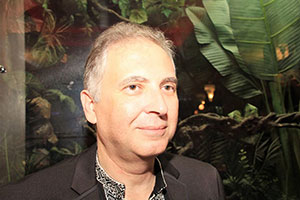 Yuri Povolotsky was born in Odessa (Ukraine) in February 1962. In 1986 he graduated from Gnesin Russian Music Academy in Moscow – faculty of composition. His teachers were Professor Heinrich Litinsky and Professor Alexey Muravlev. Moving to Israel in 1991, Yuri is a member of the Israel Composers’ League.
Yuri Povolotsky was born in Odessa (Ukraine) in February 1962. In 1986 he graduated from Gnesin Russian Music Academy in Moscow – faculty of composition. His teachers were Professor Heinrich Litinsky and Professor Alexey Muravlev. Moving to Israel in 1991, Yuri is a member of the Israel Composers’ League.
He has composed symphonic and chamber music, working in various styles and genres, performed in concerts, performances, radio and TV broadcasts in Israel and many countries all over the world. During last few years he has created some pieces connected with Jewish themes and folklore, and is Art & Musical Director of Jazz-Klezmer-Band “Apropos.art”
Many of his works have been heard at international festivals of contemporary music in USA, New Ze

